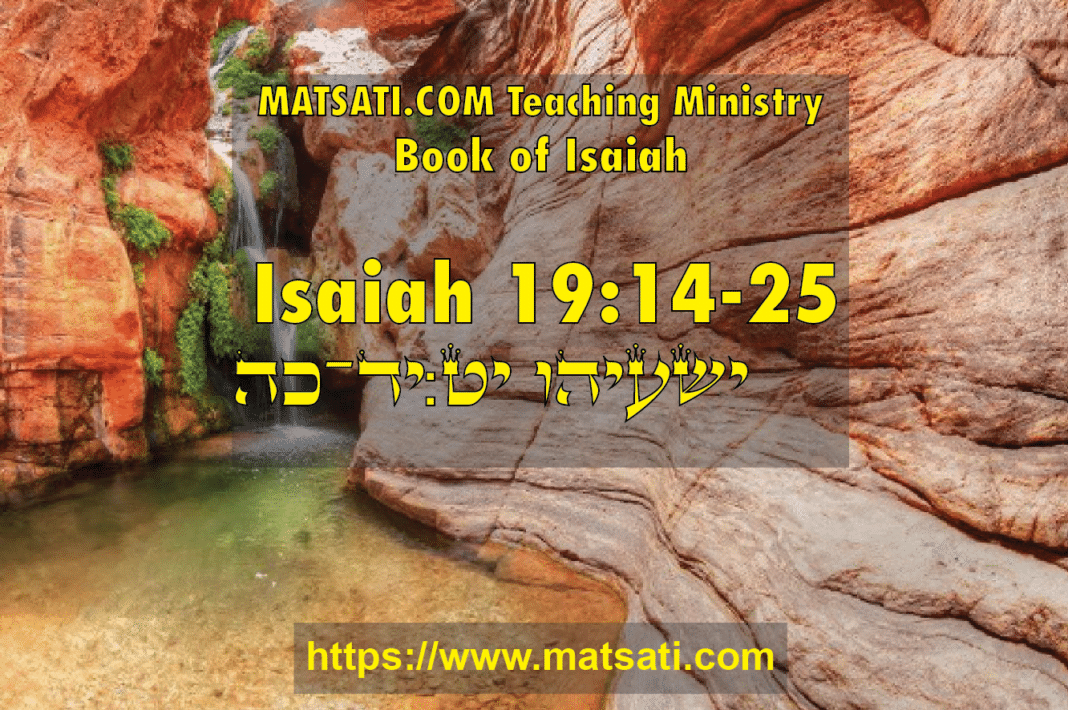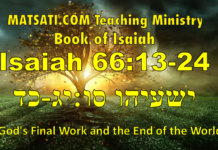Isaiah 19:14-25
According to the Narrative, HaShem is the One who is the source of all that is happening to Egypt. He allows a spirit to deceive them, to distort their ability to understand the truth, and even prevent the wisemen from understanding these things are from the Lord. The people follow what their leaders tell them mindlessly without critically examining what is being done. This is exactly what we see taking place today in the midst of the events of the present day! A spirit of deep spiritual sleep and falsehood has overtaken this world distorting truth, all we have to do is look at the morality of our culture how it continues to sink to lower and lower levels. The Tanakh provides a proof text, the spirit of falsehood in the prophets according to 1 Kings 22:23, and the evil spirit that was sent from the Lord to king Saul (1 Samuel 16:14) all working towards God’s ultimate purpose. The point of these was that those who were influenced by these evil spirits were deceived due to their departing from the faith, departing from trusting in the Lord God in heaven, and trusted in themselves bringing upon themselves a curse! (Jeremiah 17:5-10) We note a mechanistic feature here, that when one turns from the Lord God in heaven he or she turns from the truth, and so consequently opens oneself up to deception, even to that which comes by way of an evil spirit! This is clearly true based upon the Scripture! As we shall see in Isaiah 19:14, the distortion (עועים) which the spirit was given to do was to facilitate a distortion of mind and judgment. This is the perversion of the mind (לב נעוה) which produces the opposite effect as compared to wisdom (Mishley / Proverbs 12:8). The second half of Isaiah 19 transitions from judgment to salvation and redemption. We note that in the second half of chapter 19, we find five repetitions of בַּיּוֹם (in that day) providing a future expectation of events that will come to be at a future date. (See Isaiah 19:16, 19:18, 19:19, 19:23, 19:24) All of these things again demonstrate how it is foolish to trust in man or in nations, as opposed to trusting in God. Isaiah 19 ends with a positive note of redemption, and this draws on the previous prophetic word from Isaiah concerning all of the nations submitting to the Lord and streaming to God’s holy mount Zion in Jerusalem! (Isaiah 2:2-4) Isaiah continues in his message to Egypt saying the following according to Isaiah 19:14-15.
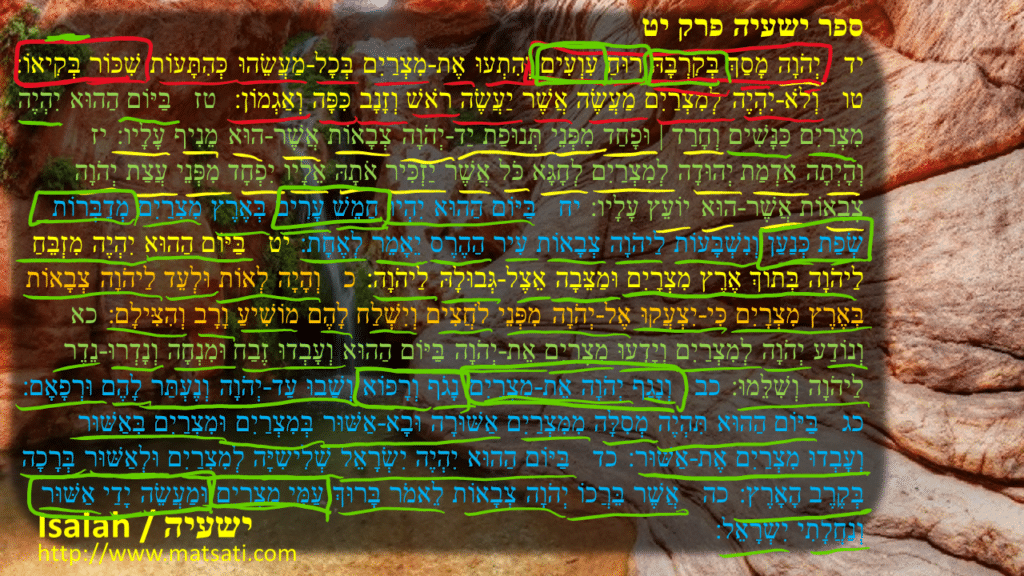
ספר ישעיה פרק יט
יד יְהֹוָה מָסַךְ בְּקִרְבָּהּ רוּחַ עִוְעִים וְהִתְעוּ אֶת-מִצְרַיִם בְּכָל-מַעֲשֵֹהוּ כְּהִתָּעוֹת שִׁכּוֹר בְּקִיאוֹ: טו וְלֹא-יִהְיֶה לְמִצְרַיִם מַעֲשֶֹה אֲשֶׁר יַעֲשֶֹה רֹאשׁ וְזָנָב כִּפָּה וְאַגְמוֹן:
Isaiah 19:14 states, “The LORD hath mingled a perverse spirit in the midst thereof: (יְהֹוָה מָסַךְ בְּקִרְבָּהּ רוּחַ עִוְעִים) and they have caused Egypt to err in every work thereof, as a drunken man staggereth in his vomit. (וְהִתְעוּ אֶת-מִצְרַיִם בְּכָל-מַעֲשֵֹהוּ כְּהִתָּעוֹת שִׁכּוֹר בְּקִיאוֹ)” Isaiah 19:15 “Neither shall there be any work for Egypt, which the head or tail, branch or rush, may do. (וְלֹא-יִהְיֶה לְמִצְרַיִם מַעֲשֶֹה אֲשֶׁר יַעֲשֶֹה רֹאשׁ וְזָנָב כִּפָּה וְאַגְמוֹן)” Isaiah uses very heavy words here against Egypt saying that it is the Lord who מָסַךְ בְּקִרְבָּהּ רוּחַ עִוְעִים “mingles within a spirit of confusion.” The word עִוְעִים comes from the word עוה meaning “to twist, to be bent, be irritated or confused.” We note that בְּקִרְבָּהּ is written in the feminine and so means “in her midst” and this “her” is a reference to all of Egypt, not just to the few in leadership. The LXX writes πνεῦμα πλανήσεως “spirit of dispersing/scattering” πλανήσεως is written in the genitive and ascribes this to this spirit that makes the people wander in confusion. This is how Isaiah continues in his proclamation saying that וְהִתְעוּ אֶת-מִצְרַיִם בְּכָל-מַעֲשֵֹהוּ כְּהִתָּעוֹת שִׁכּוֹר בְּקִיאוֹ “have caused Egypt to err in every work thereof, as a drunken man staggereth in his vomit.” Isaiah states in 19:15 that the people will not know the head from the tail, their ability to work will be completely confounded. This situation is from the Lord, and parallels what we read following the flood in Bereshit / Genesis 11, the Tower of Babel, and the Lord confusing languages. We note that when a person turns from the truth, turns from the God in heaven, the Creator God, such a person is doomed to see everything in this world through distorted lenses. We note that this is a natural outcome for those who exchange the truth for a lie, just as Paul wrote according to Romans 1:18-32. We read similar according to the Pseudepigrapha, Psalms of Solomon 8:1–15.
Pseudepigrapha – Psalms of Solomon 8:1–15
James H. Charlesworth, The Old Testament Pseudepigrapha and the New Testament: Expansions of the “Old Testament” and Legends, Wisdom, and Philosophical Literature, Prayers, Psalms and Odes, Fragments of Lost Judeo-Hellenistic Works, vol. 2 (New Haven; London: Yale University Press, 1985), 658–659.
1* My ear heard distress and the sound of war, the blast of the trumpet sounding slaughter and destruction. 2* The sound of many people as of a violent storm, as a raging fire storm sweeping through the wilderness. 3 And I said to my heart, Where, then, will God judge it? 4 I heard a sound in Jerusalem, the holy city. 5* My stomach was crushed at what I heard; my knees were weak, my heart was afraid, my bones shook like reeds. 6 I said, They directed their ways in righteousness. 7* I thought about the judgments of God since the creation of heaven and earth; I proved God right in his judgments in ages past. 8God exposed their sins in the full light of day; the whole earth knew the righteous judgments of God. 9* In secret places underground was their lawbreaking, provoking (him), son involved with mother and father with daughter; 10* Everyone committed adultery with his neighbor’s wife; they made agreements with them with an oath about these things. 11 They stole from the sanctuary of God as if there were no redeeming heir. 12* They walked on the place of sacrifice of the Lord, (coming) from all kinds of uncleanness; and (coming) with menstrual blood (on them), they defiled the sacrifices as if they were common meat. 13* There was no sin they left undone in which they did not surpass the gentiles. 14* Because of this God mixed them (a drink) of a wavering spirit, and gave them a cup of undiluted wine to make them drunk. 15 He brought someone from the end of the earth, one who attacks in strength; he declared war against Jerusalem, and her land.
The point of looking at this text is to understand how these things are believed to have worked, because Egypt turned from the Lord and sought their false gods, the Lord God Almighty mixed a drink of a wavering spirit to give to them to drink. We see similar parallels to the book of Revelation and the great whore in Babylon who made the nations to drink of her fornications. (Revelation 18:3) The major point here is that the nation of Egypt did not even realize her deception nor her drunkenness and her wavering or stumbling about as a drunken man. The language here represents total unawareness of these things. Is it surprising that Isaiah questions why Judah would want to trust in Egypt that broken reed of a nation? (2 Kings 18:21)
ספר ישעיה פרק יט
טז בַּיּוֹם הַהוּא יִהְיֶה מִצְרַיִם כַּנָּשִׁים וְחָרַד | וּפָחַד מִפְּנֵי תְּנוּפַת יַד-יְהֹוָה צְבָאוֹת אֲשֶׁר-הוּא מֵנִיף עָלָיו: יז וְהָיְתָה אַדְמַת יְהוּדָה לְמִצְרַיִם לְחָגָּא כֹּל אֲשֶׁר יַזְכִּיר אֹתָהּ אֵלָיו יִפְחָד מִפְּנֵי עֲצַת יְהֹוָה צְבָאוֹת אֲשֶׁר-הוּא יוֹעֵץ עָלָיו:
Isaiah 19:16 states, “In that day shall Egypt be like unto women: (בַּיּוֹם הַהוּא יִהְיֶה מִצְרַיִם כַּנָּשִׁים) and it shall be afraid and fear because of the shaking of the hand of the LORD of hosts, which he shaketh over it. (וְחָרַד | וּפָחַד מִפְּנֵי תְּנוּפַת יַד-יְהֹוָה צְבָאוֹת אֲשֶׁר-הוּא מֵנִיף עָלָיו)” Isaiah 19:17 “And the land of Judah shall be a terror unto Egypt, every one that maketh mention thereof shall be afraid in himself, (וְהָיְתָה אַדְמַת יְהוּדָה לְמִצְרַיִם לְחָגָּא כֹּל אֲשֶׁר יַזְכִּיר אֹתָהּ אֵלָיו יִפְחָד) because of the counsel of the LORD of hosts, which he hath determined against it. (מִפְּנֵי עֲצַת יְהֹוָה צְבָאוֹת אֲשֶׁר-הוּא יוֹעֵץ עָלָיו)” Here Isaiah compares Egypt to women who are afraid due to the impending judgment of God and the fear comes simply by the word mentioning the land of Judah. We note the terrors planed for כָּל־הָ֣עַמִּ֔ים all nations who do not submit to Israel are mentioned with specific reference to Egypt according to Zechariah 14:12-19.

ספר זכריה פסק יד
יב וְזֹ֣את׀ תִּֽהְיֶ֣ה הַמַּגֵּפָ֗ה אֲשֶׁ֨ר יִגֹּ֤ף יְהוָה֙ אֶת־כָּל־הָ֣עַמִּ֔ים אֲשֶׁ֥ר צָבְא֖וּ עַל־יְרוּשָׁלִָ֑ם הָמֵ֣ק׀ בְּשָׂר֗וֹ וְהוּא֙ עֹמֵ֣ד עַל־רַגְלָ֔יו וְעֵינָיו֙ תִּמַּ֣קְנָה בְחֹֽרֵיהֶ֔ן וּלְשׁוֹנ֖וֹ תִּמַּ֥ק בְּפִיהֶֽם׃ יג וְהָיָה֙ בַּיּ֣וֹם הַה֔וּא תִּֽהְיֶ֧ה מְהֽוּמַת־יְהוָ֛ה רַבָּ֖ה בָּהֶ֑ם וְהֶחֱזִ֗יקוּ אִ֚ישׁ יַ֣ד רֵעֵ֔הוּ וְעָלְתָ֥ה יָד֖וֹ עַל־יַ֥ד רֵעֵֽהוּ׃ יד וְגַ֨ם־יְהוּדָ֔ה תִּלָּחֵ֖ם בִּירֽוּשָׁלִָ֑ם וְאֻסַּף֩ חֵ֨יל כָּל־הַגּוֹיִ֜ם סָבִ֗יב זָהָ֥ב וָכֶ֛סֶף וּבְגָדִ֖ים לָרֹ֥ב מְאֹֽד׃ טו וְכֵ֨ן תִּֽהְיֶ֜ה מַגֵּפַ֣ת הַסּ֗וּס הַפֶּ֙רֶד֙ הַגָּמָ֣ל וְהַחֲמ֔וֹר וְכָ֨ל־הַבְּהֵמָ֔ה אֲשֶׁ֥ר יִהְיֶ֖ה בַּמַּחֲנ֣וֹת הָהֵ֑מָּה כַּמַּגֵּפָ֖ה הַזֹּֽאת׃ טז וְהָיָ֗ה כָּל־הַנּוֹתָר֙ מִכָּל־הַגּוֹיִ֔ם הַבָּאִ֖ים עַל־יְרֽוּשָׁלִָ֑ם וְעָל֞וּ מִדֵּ֧י שָׁנָ֣ה בְשָׁנָ֗ה לְהִֽשְׁתַּחֲוֺת֙ לְמֶ֙לֶךְ֙ יְהוָ֣ה צְבָא֔וֹת וְלָחֹ֖ג אֶת־חַ֥ג הַסֻּכּֽוֹת׃ יז וְ֠הָיָה אֲשֶׁ֨ר לֹֽא־יַעֲלֶ֜ה מֵאֵ֨ת מִשְׁפְּח֤וֹת הָאָ֙רֶץ֙ אֶל־יְר֣וּשָׁלִַ֔ם לְהִֽשְׁתַּחֲוֺ֔ת לְמֶ֖לֶךְ יְהוָ֣ה צְבָא֑וֹת וְלֹ֥א עֲלֵיהֶ֖ם יִהְיֶ֥ה הַגָּֽשֶׁם׃ יח וְאִם־מִשְׁפַּ֨חַת מִצְרַ֧יִם לֹֽא־תַעֲלֶ֛ה וְלֹ֥א בָאָ֖ה וְלֹ֣א עֲלֵיהֶ֑ם תִּֽהְיֶ֣ה הַמַּגֵּפָ֗ה אֲשֶׁ֨ר יִגֹּ֤ף יְהוָה֙ אֶת־הַגּוֹיִ֔ם אֲשֶׁר֙ לֹ֣א יַֽעֲל֔וּ לָחֹ֖ג אֶת־חַ֥ג הַסֻּכּֽוֹת׃ יט זֹ֥את תִּהְיֶ֖ה חַטַּ֣את מִצְרָ֑יִם וְחַטַּאת֙ כָּל־הַגּוֹיִ֔ם אֲשֶׁר֙ לֹ֣א יַֽעֲל֔וּ לָחֹ֖ג אֶת־חַ֥ג הַסֻּכּֽוֹת׃
Zechariah 14:12-19
14:12 This is the plague with which the Lord will strike all the nations that fought against Jerusalem: Their flesh will rot while they are still standing on their feet, their eyes will rot in their sockets, and their tongues will rot in their mouths. 14:13 On that day people will be stricken by the Lord with great panic. They will seize each other by the hand and attack one another. 14:14 Judah too will fight at Jerusalem. The wealth of all the surrounding nations will be collected—great quantities of gold and silver and clothing. 14:15 A similar plague will strike the horses and mules, the camels and donkeys, and all the animals in those camps. 14:16 Then the survivors from all the nations that have attacked Jerusalem will go up year after year to worship the King, the Lord Almighty, and to celebrate the Festival of Tabernacles. 14:17 If any of the peoples of the earth do not go up to Jerusalem to worship the King, the Lord Almighty, they will have no rain. 14:18 If the Egyptian people do not go up and take part, they will have no rain. The Lord will bring on them the plague he inflicts on the nations that do not go up to celebrate the Festival of Tabernacles. 14:19 This will be the punishment of Egypt and the punishment of all the nations that do not go up to celebrate the Festival of Tabernacles. (NIV)
The destruction brought upon those who stand against God’s holy city will literally become corpses as they stand ready for battle. (Zechariah 14:12) The curse to those who come against God’s people is not restricted to men only, but to their animals, horses, mules, camels, and donkeys (Zechariah 14:15) these beasts will become corpses. In addition, rain will be withheld from the nation that does not go up to worship the King, the Lord Almighty in Jerusalem. Isaiah 19:17 states that this is the עֲצַת plan of God to do these things. This is the terror of the nations, who can fight against the Living God, against the God of life, the Creator? He has the power to take the gift of life and breath from those whom He chooses, and the end result would be exactly what we are reading here in Isaiah and Zechariah! This fearfulness should ultimately lead to repentance and then healing from the Lord. There is a messianic expectation here, of the people looking for their Redeemer, and Isaiah promises exactly that! The judgment that is being brought against Egypt should signal a time for repentance, to look for the reasons why these evil things are happening in their lives. This is what the Lord God wants to show us in our lives, to repent and turn from sin, and live our lives to bring glory to God in heaven. The point seems that the Lord God is seeking to bring all nations to Himself. Isaiah goes on saying the following:
ספר ישעיה פרק יט
יח בַּיּוֹם הַהוּא יִהְיוּ חָמֵשׁ עָרִים בְּאֶרֶץ מִצְרַיִם מְדַבְּרוֹת שְֹפַת כְּנַעַן וְנִשְׁבָּעוֹת לַיהֹוָה צְבָאוֹת עִיר הַהֶרֶס יֵאָמֵר לְאֶחָת:
Isaiah 19:18 states, “In that day shall five cities in the land of Egypt speak the language of Canaan, (בַּיּוֹם הַהוּא יִהְיוּ חָמֵשׁ עָרִים בְּאֶרֶץ מִצְרַיִם מְדַבְּרוֹת שְֹפַת כְּנַעַן) and swear to the LORD of hosts; one shall be called, The city of destruction. (וְנִשְׁבָּעוֹת לַיהֹוָה צְבָאוֹת עִיר הַהֶרֶס יֵאָמֵר לְאֶחָת)” Here the language of Canaan is a reference to the land of Israel speaking Hebrew language. The God of Israel will have such an influence upon Egypt that יִהְיוּ חָמֵשׁ עָרִים בְּאֶרֶץ מִצְרַיִם 5 cities will speak this language in Egypt. The LXX translates this as this city will be called the city of Asedek.
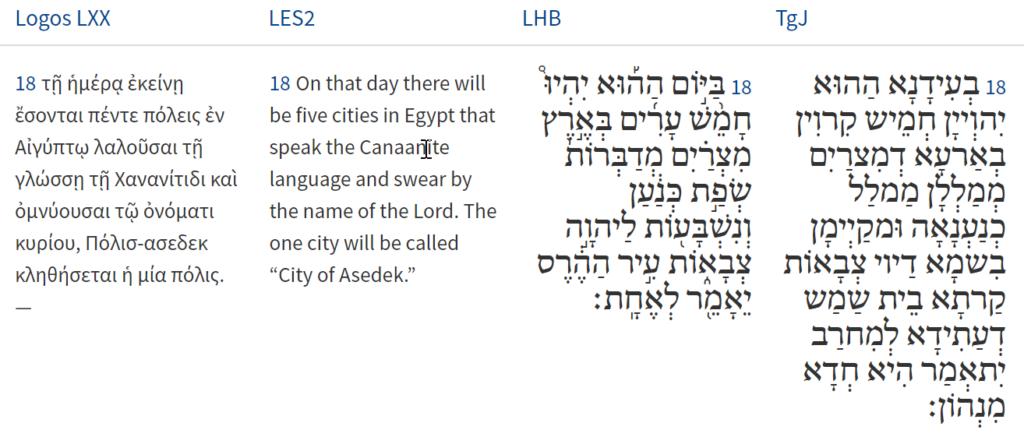
What is the city of Asedek? Here the Greek word ἀσεδέκ means “destruction,” so there is a transliteration of the Greek text. An interesting alternative interpretation to the LXX reading, ἀσεδέκ may be a transliteration of the Hebrew haṣṣeḏeq, “the righteous.” We note that the city of Jerusalem is called “the city of righteousness” in Isaiah 1:26 (I will restore your leaders as in days of old, your rulers as at the beginning. Afterward you will be called the City of Righteousness, the Faithful City.” וְאָשִׁ֤יבָה שֹׁפְטַ֙יִךְ֙ כְּבָרִ֣אשֹׁנָ֔ה וְיֹעֲצַ֖יִךְ כְּבַתְּחִלָּ֑ה אַחֲרֵי־כֵ֗ן יִקָּ֤רֵא לָךְ֙ עִ֣יר הַצֶּ֔דֶק קִרְיָ֖ה נֶאֱמָנָֽה׃). Interesting that one of the cities may be an Egyptian version of “Jerusalem.” To add credence to this, the TgJ writes “At that time, there shall be five cities in the land of Egypt, speaking the language of Canaan, and swearing by the name of the Lord of hosts. The city of Beth-Shemesh (בֵית שַמַש), which is to be destroyed, shall be called one of them.” This appears to be the “city of the sun” and may be a reference to a former location of Egyptian worship of Ra where the inhabitants then turn to serving the Living God of Israel. There is an interesting interpretation from the Torah and the Neviim sections of the Tanakh, where the number five is said to strike fear in a hundred people, “five shall chase one hundred” (Bereshit / Genesis 43:34, Vayikra / Leviticus 26:8, 1 Samuel 17:40, 2 Kings 7:13, Isaiah 30:17, and 1 Corinthians 14:19). This suggests that a small number will strike fear in a larger number, and it may be these five cities in Egypt will influence the entire nation of Egypt on a positive note for the glory of God, metaphorically and literally. John Oswalt states, “The ‘city of the sun’ would undoubtedly be Heliopolis, the biblical On, the seat of the worship of Ra, the great Egyptian sun-god. On this reading Isaiah would be remarking that none other than Re’s own city would one day go so far in its allegiance to Yahweh as to adopt the language of his country.” Isaiah goes on saying the following:
ספר ישעיה פרק יט
יט בַּיּוֹם הַהוּא יִהְיֶה מִזְבֵּחַ לַיהֹוָה בְּתוֹךְ אֶרֶץ מִצְרָיִם וּמַצֵּבָה אֵצֶל-גְּבוּלָהּ לַיהֹוָה:
Isaiah 19:19 states, “In that day shall there be an altar to the LORD in the midst of the land of Egypt, and a pillar at the border thereof to the Lord. (בַּיּוֹם הַהוּא יִהְיֶה מִזְבֵּחַ לַיהֹוָה בְּתוֹךְ אֶרֶץ מִצְרָיִם וּמַצֵּבָה אֵצֶל-גְּבוּלָהּ לַיהֹוָה)” Does this remind us from the Torah what Jacob did before leaving to the land of Haran fleeing his brother Esau? There are actually four pillars that Jacob made according to the Torah, Bereshit / Genesis 28:18, 31:45, 35:14, and 35:20. The first pillar was at Bethel.
ספר בראשית פרק כח
יח וַיַּשְׁכֵּם יַעֲקֹב בַּבֹּקֶר וַיִּקַּח אֶת-הָאֶבֶן אֲשֶׁר-שָֹם מְרַאֲשֹׁתָיו וַיָּשֶֹם אֹתָהּ מַצֵּבָה וַיִּצֹק שֶׁמֶן עַל-רֹאשָׁהּ:
Bereshit / Genesis 28:18
28:18 And Jacob rose up early in the morning, and took the stone that he had put under his head, and set it up for a pillar, and poured oil upon the top of it. (NASB)
In Parashat Vayetze (Bereshit / Genesis 28:10-32:2) Jacob sees a vision of the house of God, heaven opened, and angels ascending and descending. The effect of this vision upon Jacob was that he was humbled. He then built a pillar and anointed it with oil, then made a statement of his faith and then of God’s commitment to him to bring him back to the land.
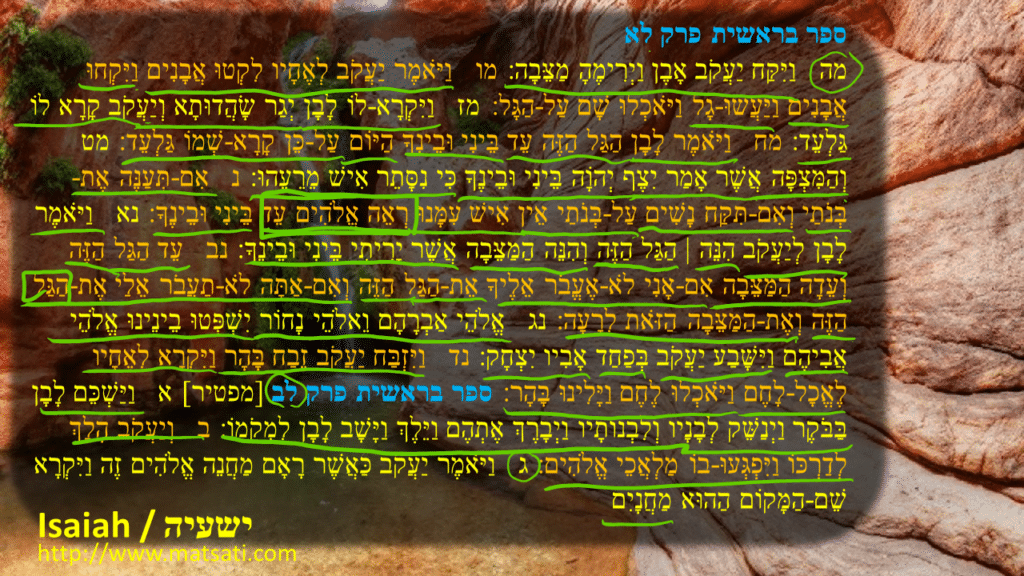
ספר בראשית פרק לא
מה וַיִּקַּח יַעֲקֹב אָבֶן וַיְרִימֶהָ מַצֵּבָה: מו וַיֹּאמֶר יַעֲקֹב לְאֶחָיו לִקְטוּ אֲבָנִים וַיִּקְחוּ אֲבָנִים וַיַּעֲשֹוּ-גָל וַיֹּאכְלוּ שָׁם עַל-הַגָּל: מז וַיִּקְרָא-לוֹ לָבָן יְגַר שָֹהֲדוּתָא וְיַעֲקֹב קָרָא לוֹ גַּלְעֵד: מח וַיֹּאמֶר לָבָן הַגַּל הַזֶּה עֵד בֵּינִי וּבֵינְךָ הַיּוֹם עַל-כֵּן קָרָא-שְׁמוֹ גַּלְעֵד: מט וְהַמִּצְפָּה אֲשֶׁר אָמַר יִצֶף יְהוָֹה בֵּינִי וּבֵינֶךָ כִּי נִסָּתֵר אִישׁ מֵרֵעֵהוּ: נ אִם-תְּעַנֶּה אֶת-בְּנֹתַי וְאִם-תִּקַּח נָשִׁים עַל-בְּנֹתַי אֵין אִישׁ עִמָּנוּ רְאֵה אֱלֹהִים עֵד בֵּינִי וּבֵינֶךָ: נא וַיֹּאמֶר לָבָן לְיַעֲקֹב הִנֵּה | הַגַּל הַזֶּה וְהִנֵּה הַמַּצֵּבָה אֲשֶׁר יָרִיתִי בֵּינִי וּבֵינֶךָ: נב עֵד הַגַּל הַזֶּה וְעֵדָה הַמַּצֵּבָה אִם-אָנִי לֹא-אֶעֱבֹר אֵלֶיךָ אֶת-הַגַּל הַזֶּה וְאִם-אַתָּה לֹא-תַעֲבֹר אֵלַי אֶת-הַגַּל הַזֶּה וְאֶת-הַמַּצֵּבָה הַזֹּאת לְרָעָה: נג אֱלֹהֵי אַבְרָהָם וֵאלֹהֵי נָחוֹר יִשְׁפְּטוּ בֵינֵינוּ אֱלֹהֵי אֲבִיהֶם וַיִּשָּׁבַע יַעֲקֹב בְּפַחַד אָבִיו יִצְחָק: נד וַיִּזְבַּח יַעֲקֹב זֶבַח בָּהָר וַיִּקְרָא לְאֶחָיו לֶאֱכָל-לָחֶם וַיֹּאכְלוּ לֶחֶם וַיָּלִינוּ בָּהָר: ספר בראשית פרק לב [מפטיר] א וַיַּשְׁכֵּם לָבָן בַּבֹּקֶר וַיְנַשֵּׁק לְבָנָיו וְלִבְנוֹתָיו וַיְבָרֶךְ אֶתְהֶם וַיֵּלֶךְ וַיָּשָׁב לָבָן לִמְקֹמוֹ: ב וְיַעֲקֹב הָלַךְ לְדַרְכּוֹ וַיִּפְגְּעוּ-בוֹ מַלְאֲכֵי אֱלֹהִים: ג וַיֹּאמֶר יַעֲקֹב כַּאֲשֶׁר רָאָם מַחֲנֵה אֱלֹהִים זֶה וַיִּקְרָא שֵׁם-הַמָּקוֹם הַהוּא מַחֲנָיִם:
Bereshit / Genesis 31:45-32:2)
31:45 And Jacob took a stone, and set it up for a pillar. 31:46 And Jacob said unto his brethren, Gather stones; and they took stones, and made a heap: and they did eat there upon the heap. 31:47 And Laban called it Jegarsahadutha: but Jacob called it Galeed. 31:48 And Laban said, This heap is a witness between me and thee this day. Therefore was the name of it called Galeed; 31:49 And Mizpah; for he said, The LORD watch between me and thee, when we are absent one from another. 31:50 If thou shalt afflict my daughters, or if thou shalt take other wives beside my daughters, no man is with us; see, God is witness betwixt me and thee. 31:51 And Laban said to Jacob, Behold this heap, and behold this pillar, which I have cast betwixt me and thee: 31:52 This heap be witness, and this pillar be witness, that I will not pass over this heap to thee, and that thou shalt not pass over this heap and this pillar unto me, for harm. 31:53 The God of Abraham, and the God of Nahor, the God of their father, judge between us. And Jacob swears by the fear of his father Isaac. 31:54 Then Jacob offered sacrifice upon the mount, and called his brethren to eat bread: and they did eat bread, and tarried all night in the mount. 31:55 And early in the morning Laban rose up, and kissed his sons and his daughters, and blessed them: and Laban departed, and returned unto his place. 32:1 And Jacob went on his way, and the angels of God met him. 32:2 And when Jacob saw them, he said, This is God’s host: and he called the name of that place Mahanaim. (KJV)
Here the Lord God told Jacob to return to the land of his birth, and so he took his wives, children, and all that he owned, and went to the land of Canaan. Laban realized he had left and so he followed him, and God warned Laban not to do anything and not to say a word to him either good or bad. So Laban and Jacob made a covenant together and built a pillar which we read according to Bereshit / Genesis 31:45-32:2. This is where Jacob wrestled with God and had his name changed to Israel. This is also the closest reference to what we read according to Isaiah 19:19 and the pillar at the border of the land. After these events, Jacob journeyed to Bethel, to the place of his vision. Then we read that God appeared to Jacob again when he came out of Padanaram and affirmed his name change to Israel.
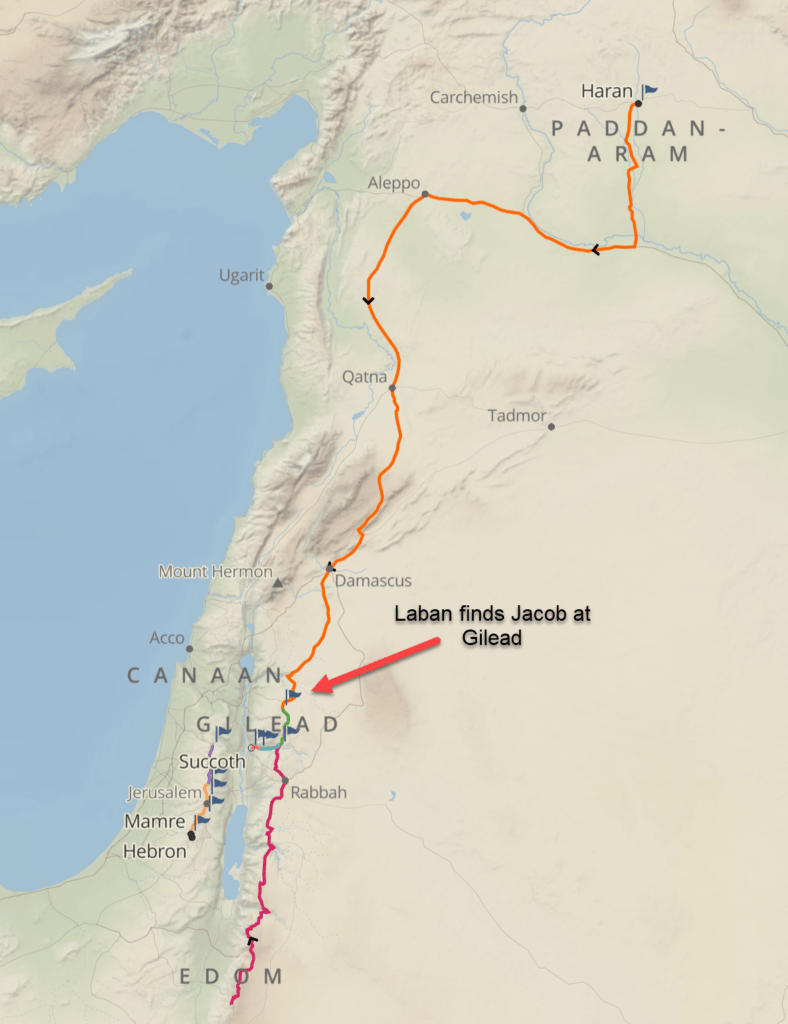
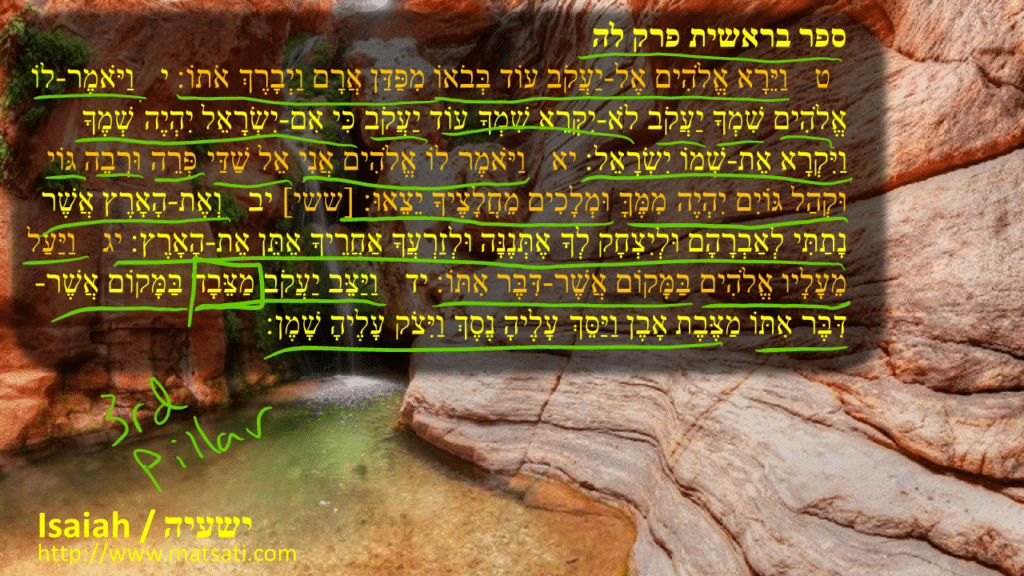
ספר בראשית פרק לה
ט וַיֵּרָא אֱלֹהִים אֶל-יַעֲקֹב עוֹד בְּבֹאוֹ מִפַּדַּן אֲרָם וַיְבָרֶךְ אֹתוֹ: י וַיֹּאמֶר-לוֹ אֱלֹהִים שִׁמְךָ יַעֲקֹב לֹא-יִקָּרֵא שִׁמְךָ עוֹד יַעֲקֹב כִּי אִם-יִשְֹרָאֵל יִהְיֶה שְׁמֶךָ וַיִּקְרָא אֶת-שְׁמוֹ יִשְֹרָאֵל: יא וַיֹּאמֶר לוֹ אֱלֹהִים אֲנִי אֵל שַׁדַּי פְּרֵה וּרְבֵה גּוֹי וּקְהַל גּוֹיִם יִהְיֶה מִמֶּךָּ וּמְלָכִים מֵחֲלָצֶיךָ יֵצֵאוּ: [ששי] יב וְאֶת-הָאָרֶץ אֲשֶׁר נָתַתִּי לְאַבְרָהָם וּלְיִצְחָק לְךָ אֶתְּנֶנָּה וּלְזַרְעֲךָ אַחֲרֶיךָ אֶתֵּן אֶת-הָאָרֶץ: יג וַיַּעַל מֵעָלָיו אֱלֹהִים בַּמָּקוֹם אֲשֶׁר-דִּבֶּר אִתּוֹ: יד וַיַּצֵּב יַעֲקֹב מַצֵּבָה בַּמָּקוֹם אֲשֶׁר-דִּבֶּר אִתּוֹ מַצֶּבֶת אָבֶן וַיַּסֵּךְ עָלֶיהָ נֶסֶךְ וַיִּצֹק עָלֶיהָ שָׁמֶן:
Bereshit / Genesis 35:9-14
35:9 And God appeared unto Jacob again, when he came out of Padanaram, and blessed him. 35:10 And God said unto him, Thy name is Jacob: thy name shall not be called any more Jacob, but Israel shall be thy name: and he called his name Israel. 35:11 And God said unto him, I am God Almighty: be fruitful and multiply; a nation and a company of nations shall be of thee, and kings shall come out of thy loins; 35:12 And the land which I gave Abraham and Isaac, to thee I will give it, and to thy seed after thee will I give the land. 35:13 And God went up from him in the place where he talked with him. 35:14 And Jacob set up a pillar in the place where he talked with him, even a pillar of stone: and he poured a drink offering thereon, and he poured oil thereon. (KJV)
The last pillar was set up when His wife died, we read according to Bereshit / Genesis 35:15-21.
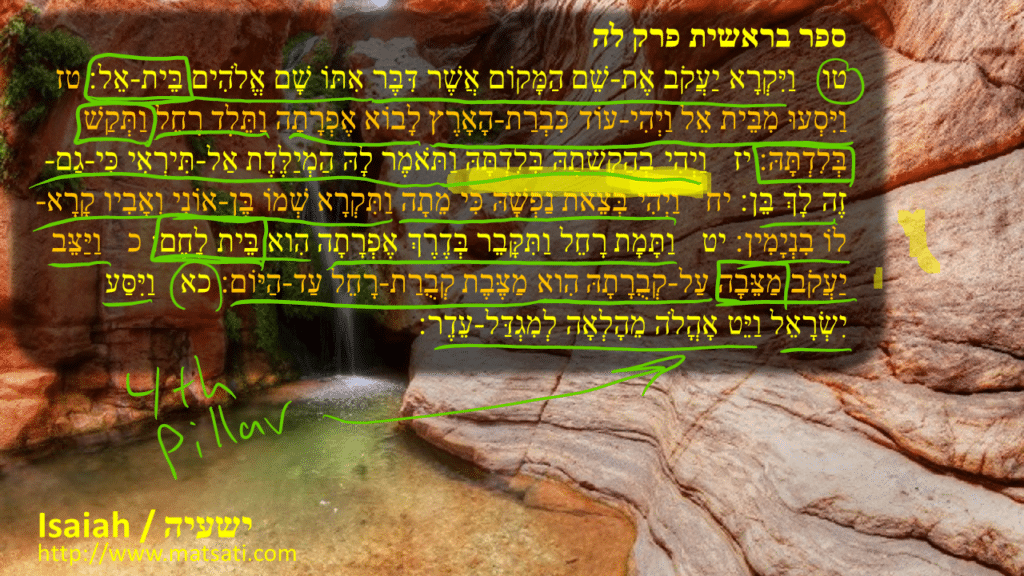
ספר בראשית פרק לה
טו וַיִּקְרָא יַעֲקֹב אֶת-שֵׁם הַמָּקוֹם אֲשֶׁר דִּבֶּר אִתּוֹ שָׁם אֱלֹהִים בֵּית-אֵל: טז וַיִּסְעוּ מִבֵּית אֵל וַיְהִי-עוֹד כִּבְרַת-הָאָרֶץ לָבוֹא אֶפְרָתָה וַתֵּלֶד רָחֵל וַתְּקַשׁ בְּלִדְתָּהּ: יז וַיְהִי בְהַקְשֹׁתָהּ בְּלִדְתָּהּ וַתֹּאמֶר לָהּ הַמְיַלֶּדֶת אַל-תִּירְאִי כִּי-גַם-זֶה לָךְ בֵּן: יח וַיְהִי בְּצֵאת נַפְשָׁהּ כִּי מֵתָה וַתִּקְרָא שְׁמוֹ בֶּן-אוֹנִי וְאָבִיו קָרָא-לוֹ בִנְיָמִין: יט וַתָּמָת רָחֵל וַתִּקָּבֵר בְּדֶרֶךְ אֶפְרָתָה הִוא בֵּית לָחֶם: כ וַיַּצֵּב יַעֲקֹב מַצֵּבָה עַל-קְבֻרָתָהּ הִוא מַצֶּבֶת קְבֻרַת-רָחֵל עַד-הַיּוֹם: כא וַיִּסַּע יִשְֹרָאֵל וַיֵּט אָהֳלֹה מֵהָלְאָה לְמִגְדַּל-עֵדֶר:
Bereshit / Genesis 35:15-21
35:15 And Jacob called the name of the place where God spoke with him, Bethel. 35:16 And they journeyed from Bethel; and there was but a little way to come to Ephrath: and Rachel travailed, and she had hard labor. 35:17 And it came to pass, when she was in hard labor, that the midwife said unto her, Fear not; thou shalt have this son also. 35:18 And it came to pass, as her soul was in departing, (for she died) that she called his name Benoni: but his father called him Benjamin. 35:19 And Rachel died, and was buried on the way to Ephrath, which is Bethlehem. 35:20 And Jacob set a pillar upon her grave: that is the pillar of Rachel’s grave unto this day. 35:21 And Israel journeyed, and spread his tent beyond the tower of Edar. (KJV)
Note that each one of these pillars represents an act of faith on behalf of Jacob. We note that throughout Jacob’s life, the Lord God worked to bless him but it is important to note that Jacob was not without responsibility, to remain faithful, and Jacob had to build the pillars, the Lord God did not build the pillars for him. These pillars represent covenant faith, and the pillar is an outward statement of one’s faith, which may be the point of what we read in Isaiah 19:19 “In that day shall there be an altar to the LORD in the midst of the land of Egypt, and a pillar at the border thereof to the Lord (בַּיּוֹם הַהוּא יִהְיֶה מִזְבֵּחַ לַיהֹוָה בְּתוֹךְ אֶרֶץ מִצְרָיִם וּמַצֵּבָה אֵצֶל-גְּבוּלָהּ לַיהֹוָה)” of both the altar and the pillar. Note that the altar does not mean that Egypt set up their own form of worship to the Lord, but may parallel what the Tribe of Reuben did on the other side of the Jordan as a memorial to the Lord to remember His covenant and promises, etc. These things speak to our being whole hearted towards the Lord, and the pillar represents our boldness to proclaim that faith to the world and not be ashamed of our faith in Yeshua. Most significantly, the fourth pillar that Jacob set up over his wife’s grave, this was on the road to Bethlehem, the city of the birth of our Savior Yeshua the Messiah! We note that Rachel’s death reminds us of the NT significance of this place, of the Messiah and Resurrection (future expectation of the Messiah overcoming death and the grave.) These things remind us of how when given to our own ways this leads us in the opposite direction as opposed to the way in which God wants for our lives! Isaiah’s prophecy suggests Egypt’s future conversion to faith in the God of Israel. A pagan nation and a pagan people turning from their ways to the way of truth, life, righteousness, and holiness according to God’s holy word. An interesting point is when Abraham wished to express his gratitude and allegiance with God in heaven, he built an altar (Bereshit / Genesis 12:8). When Jacob wished to formalize his acceptance of God’s covenant-offer, he set up a pillar (Bereshit / Genesis 28:22). In parallel fashion we see a combination here in Isaiah 19:19 of the altar and the pillar. So when Egypt wishes to express gratitude to God and enter into a covenant with him, they build an altar and a pillar.
ספר ישעיה פרק יט
כ וְהָיָה לְאוֹת וּלְעֵד לַיהֹוָה צְבָאוֹת בְּאֶרֶץ מִצְרָיִם כִּי-יִצְעֲקוּ אֶל-יְהֹוָה מִפְּנֵי לֹחֲצִים וְיִשְׁלַח לָהֶם מוֹשִׁיעַ וָרָב וְהִצִּילָם:
Isaiah 19:20 states, “And it shall be for a sign and for a witness unto the LORD of hosts in the land of Egypt: (וְהָיָה לְאוֹת וּלְעֵד לַיהֹוָה צְבָאוֹת בְּאֶרֶץ מִצְרָיִם) for they shall cry unto the LORD because of the oppressors, and he shall send them a savior, and a great one, and he shall deliver them. (כִּי-יִצְעֲקוּ אֶל-יְהֹוָה מִפְּנֵי לֹחֲצִים וְיִשְׁלַח לָהֶם מוֹשִׁיעַ וָרָב וְהִצִּילָם)” Note how Isaiah states these things explicitly according to Isaiah 19:20 that Egypt will turn to the Lord, and the altar and the pillar will stand for a sign and for a witness unto the Lord of hosts. There is a messianic expectation here from the sense of the Lord God sending a deliverer for the Egyptian people as they cry out unto the Lord.
ספר ישעיה פרק יט
כא וְנוֹדַע יְהֹוָה לְמִצְרַיִם וְיָדְעוּ מִצְרַיִם אֶת-יְהֹוָה בַּיּוֹם הַהוּא וְעָבְדוּ זֶבַח וּמִנְחָה וְנָדְרוּ-נֵדֶר לַיהֹוָה וְשִׁלֵּמוּ:
Isaiah 19:21 states, “And the LORD shall be known to Egypt, and the Egyptians shall know the LORD in that day, and shall do sacrifice and oblation; yea, they shall vow a vow unto the LORD, and perform it. (וְנוֹדַע יְהֹוָה לְמִצְרַיִם וְיָדְעוּ מִצְרַיִם אֶת-יְהֹוָה בַּיּוֹם הַהוּא וְעָבְדוּ זֶבַח וּמִנְחָה וְנָדְרוּ-נֵדֶר לַיהֹוָה וְשִׁלֵּמוּ)” Here the Egyptians are said to worship the Lord God Almighty openly. We note the patience and mercy of God to the Egyptians over the centuries. The ultimate outcome is the Lord desires that all men enter into a relationship with Him. (Jeremiah 9:23-25,Hosea 4:1, 13:4-5, Isaiah 1:3, 43:10, 45:3, 60:16) According to the Torah, Egypt had experienced the Lord God of Israel through defeat only. (Shemot / Exodus 7:5, 9:28 (29 English), 14:4) Based upon Isaiah’s proclamation, Egypt will know God for His mercy, and worship the Lord. We note that when the Egyptians make a vow, just like in other places throughout scripture, the outcome is to do something, and can be a statement of faith as well. (Devarim / Deuteronomy 23:21-23 and 1 Samuel 1:11)
ספר ישעיה פרק יט
כב וְנָגַף יְהֹוָה אֶת-מִצְרַיִם נָגֹף וְרָפוֹא וְשָׁבוּ עַד-יְהֹוָה וְנֶעְתַּר לָהֶם וּרְפָאָם: כג בַּיּוֹם הַהוּא תִּהְיֶה מְסִלָּה מִמִּצְרַיִם אַשּׁוּרָה וּבָא-אַשּׁוּר בְּמִצְרַיִם וּמִצְרַיִם בְּאַשּׁוּר וְעָבְדוּ מִצְרַיִם אֶת-אַשּׁוּר: כד בַּיּוֹם הַהוּא יִהְיֶה יִשְֹרָאֵל שְׁלִישִׁיָּה לְמִצְרַיִם וּלְאַשּׁוּר בְּרָכָה בְּקֶרֶב הָאָרֶץ: כה אֲשֶׁר בֵּרֲכוֹ יְהֹוָה צְבָאוֹת לֵאמֹר בָּרוּךְ עַמִּי מִצְרַיִם וּמַעֲשֵֹה יָדַי אַשּׁוּר וְנַחֲלָתִי יִשְֹרָאֵל:
Isaiah 19:22 states, “And the LORD shall smite Egypt: he shall smite and heal it: and they shall return even to the LORD, and he shall be intreated of them, and shall heal them. (וְנָגַף יְהֹוָה אֶת-מִצְרַיִם נָגֹף וְרָפוֹא וְשָׁבוּ עַד-יְהֹוָה וְנֶעְתַּר לָהֶם וּרְפָאָם)” Isaiah 19:23 “In that day shall there be a highway out of Egypt to Assyria, and the Assyrian shall come into Egypt, (בַּיּוֹם הַהוּא תִּהְיֶה מְסִלָּה מִמִּצְרַיִם אַשּׁוּרָה וּבָא-אַשּׁוּר בְּמִצְרַיִם) and the Egyptian into Assyria, and the Egyptians shall serve with the Assyrians. (וּמִצְרַיִם בְּאַשּׁוּר וְעָבְדוּ מִצְרַיִם אֶת-אַשּׁוּר)” Isaiah 19:24 “In that day shall Israel be the third with Egypt and with Assyria, even a blessing in the midst of the land: (בַּיּוֹם הַהוּא יִהְיֶה יִשְֹרָאֵל שְׁלִישִׁיָּה לְמִצְרַיִם וּלְאַשּׁוּר בְּרָכָה בְּקֶרֶב הָאָרֶץ)” Isaiah 19:25 “Whom the LORD of hosts shall bless, saying, Blessed be Egypt my people, and Assyria the work of my hands, and Israel mine inheritance. (אֲשֶׁר בֵּרֲכוֹ יְהֹוָה צְבָאוֹת לֵאמֹר בָּרוּךְ עַמִּי מִצְרַיִם וּמַעֲשֵֹה יָדַי אַשּׁוּר וְנַחֲלָתִי יִשְֹרָאֵל)” Notice that God says through Isaiah, that the Lord will נָגֹ֣ף וְרָפ֑וֹא “strike and heal” this appears to be disciplining behavior, such that Egypt will know it is the Lord who does these things. (Hosea 6:1) Isaiah 19:23 appears to be a statement of servitude, that Assyria will come, and Egypt will serve them. But Isaiah 19:24 suggests unity from the sense of serving out of humbleness of heart, as opposed to oppression from war. So, the idea is that Egypt will serve God along with Assyria. Egypt and Assyria are placed in parallel with Judah and Jerusalem being a blessing unto them. We note how God calls Egypt my people (Isaiah 10:24, 43:6-7, Hosea 1:10, 2:23, Jeremiah 11:4) and Assyria the work of my hand (Isaiah 60:21, 64:8, Tehillim / Psalms 119:73, 138:8. The point is that all of these nations can be in unity in spirit and in worship only if they are serving the Lord God in heaven. We notice how there is a messianic aspect in this chapter, especially in the parallels we find to Isaiah 19:19 and the altar and the pillars and to Bethlehem and the Messiah Yeshua! These things all speak to God’s love for people and nations, to call all people to turn from their sins, and to seek the God of Israel though the Messiah Yeshua! And by faith and the indwelling of God’s Holy Spirit, we can all be friends, at peace, and serve the Lord God Almighty together and enjoy His blessing upon our lives!
Rabbinic commentary
The Targum Jonathan is an Aramaic and a Rabbinic translation of the book of Isaiah and becomes a very important translation to look at as we study the book of Isaiah.
תרגום יונתן בן עוזיאל אל ישעיה פרק יט:יד-כה
יד יוי רְמָא בֵינֵיהֹון רוּחַ דְטָעוּ וְאַטעִיוּ יָת מִצרָאֵי בְכָל עוּבָדֵיהֹון כְמָא דְטָעֵי רָויָא וּמִידַשדַש בְתֹובֵיה׃ טו וְלָא יְהֵי לְמִצרָאֵי מַלכָא דְיִמלֹוך † רֵיש וְהַגמֹון שִלטֹון וְאִיטְרֹון׃ טז בְעִידָנָא הַהוּא יְהֹון מִצרָאֵי חַלָשִין כִנשַיָא וִיזוּעוּן וְיִתַברוּן מִן קֳדָם אְרָמוּת גְבוּרְתָא דַיוי צְבָאֹות דְהוּא מְרִים עְלֵיהֹון׃ יז וּתהֵי אַרעָא דְבֵית יְהוּדָה לְמִצרָיִם לְדַחלָא כָל דְיַדכַר יָתַה לֵיה יְזוּעַ מִן קֳדָם מִלכָא דַיוי צְבָאֹות דְהוּא מְלִיך עְלֵיהֹון׃ יח בְעִידָנָא הַהוּא יִהוְייָן חְמֵיש קִרוִין בְאַרעָא דְמִצרַיִם מְמַלְלָן מַמלַל כְנַעְנָאָה וּמקַיְימָן בִשמָא דַיוי צְבָאֹות קַרתָא בֵית שַמַש דְעַתִידָא לְמִחרַב יִתאְמַר הִיא חְדָא מִנְהֹון׃ יט בְעִידָנָא הַהוּא יְהֵי מַדבְחָא מְתֻקַן קֳדָם יוי בְגֹו אַרעָא דַמִצרָיִם וְקָמְתָא בִסטַר תְחוּמַה קֳדָם יוי׃ כ וִיהֵי לְאָת וּלסָהִיד קֳדָם יוי צְבָאֹות בְאַרעָא דְמִצרָיִם אְרֵי יְצַלֹון קֳדָם יוי מִן קֳדָם דָחְקֵיהֹון וְיִשלַח לְהֹון פָרִיק וְדַייָן וִישֵיזֵיבִנוּן׃ כא וְתִתגְלֵי גְבוּרְתָא דַיוי לְאֵיטָבָא לְמִצרָאֵי וְיִדְעוּן מִצרָאֵי לְמִדחַל מִן קֳדָם יוי בְעִידָנָא הַהוּא וְיִפלְחוּן בְנִכסַת קֻדשִין וּבקֻרבָנִין וְינַדרוּן נִדרִין קֳדָם יוי וִישַלְמוּן׃ כב וְיִמחֵי יוי יָת מִצרָאֵי מַחָא וְיַסֵינוּן וִיתוּבוּן לְפוּלחָנָא דַיוי וִיקַבֵיל צְלֹותְהֹון וְיַסֵי יָתְהֹון׃ כג בְעִידָנָא הַהוּא תְהֵי אֹורַח כְבִישָא מִמִצרַיִם לְאַתוּר וִיגִיחוּן אַתוּרָאֵי בְמִצרָאֵי וּמִצרָאֵי בְאַתוּרָאֵי וְיִפלְחוּן מִצרָאֵי יָת אַתוּרָאֵי׃ כד בְעִידָנָא הַהוּא יְהֵי יִשׂרָאֵל תְלִיתַי לְמִצרָאֵי וּלאַתוּרָאֵי בִרכָא בְגַוַה דְאַרעָא׃ כה דְבָרְכֵיה יוי צְבָאֹות לְמֵימַר בְרִיך עַמִי דְאַפֵיקִית מִמִצרַיִם דְעַל דְחָבוּ קֳדָמַי אַגלִיתִי יָתְהֹון לְאַתוּר וְכַדוּ דְתָבוּ מִתקְרַן עַמִי וְאַחסָנְתִי יִשׂרָאֵל׃
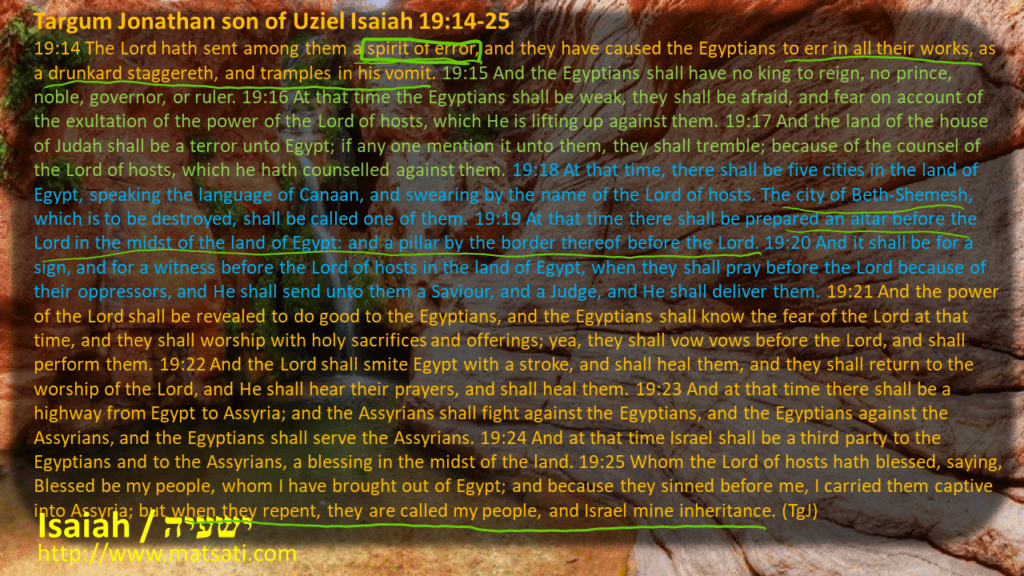
Targum Jonathan son of Uziel Isaiah 19:14-25
19:14 The Lord hath sent among them a spirit of error, and they have caused the Egyptians to err in all their works, as a drunkard staggereth, and tramples in his vomit. 19:15 And the Egyptians shall have no king to reign, no prince, noble, governor, or ruler. 19:16 At that time the Egyptians shall be weak, they shall be afraid, and fear on account of the exultation of the power of the Lord of hosts, which He is lifting up against them. 19:17 And the land of the house of Judah shall be a terror unto Egypt; if any one mention it unto them, they shall tremble; because of the counsel of the Lord of hosts, which he hath counselled against them. 19:18 At that time, there shall be five cities in the land of Egypt, speaking the language of Canaan, and swearing by the name of the Lord of hosts. The city of Beth-Shemesh, which is to be destroyed, shall be called one of them. 19:19 At that time there shall be prepared an altar before the Lord in the midst of the land of Egypt: and a pillar by the border thereof before the Lord. 19:20 And it shall be for a sign, and for a witness before the Lord of hosts in the land of Egypt, when they shall pray before the Lord because of their oppressors, and He shall send unto them a Saviour, and a Judge, and He shall deliver them. 19:21 And the power of the Lord shall be revealed to do good to the Egyptians, and the Egyptians shall know the fear of the Lord at that time, and they shall worship with holy sacrifices and offerings; yea, they shall vow vows before the Lord, and shall perform them. 19:22 And the Lord shall smite Egypt with a stroke, and shall heal them, and they shall return to the worship of the Lord, and He shall hear their prayers, and shall heal them. 19:23 And at that time there shall be a highway from Egypt to Assyria; and the Assyrians shall fight against the Egyptians, and the Egyptians against the Assyrians, and the Egyptians shall serve the Assyrians. 19:24 And at that time Israel shall be a third party to the Egyptians and to the Assyrians, a blessing in the midst of the land. 19:25 Whom the Lord of hosts hath blessed, saying, Blessed be my people, whom I have brought out of Egypt; and because they sinned before me, I carried them captive into Assyria; but when they repent, they are called my people, and Israel mine inheritance. (TgJ)
The MSS write ר֣וּחַ עִוְעִ֑ים “spirit of confusion” whereas the TgJ speaks of רוּחַ דְטָעוּ “the spirit of error” that has been given to the people. The spirit of error is exactly what its name implies. This spirit causes people to go into error to the extreme especially in things pertaining to God. We note that we are able to see this spirit in operation today in the LGBT community, as an example, those who are involved in gender pronouns, men who want to be women and women who want to be men (Trans) those who are involved in this are unable to define what it means to be a man, or what it means to be a woman. If asked, they say they are unable to define what constitutes, or what determines male and female. The fact is that male and female are written into our genetic code at the deepest level we know who we are based upon biology. We note for example, men and women who have died thousands of years ago, we are able to look at their bones and tell the differences and distinguish whether they were male, or female based upon their bone structure. We don’t need to know how they thought, dressed, or lived, in order to know their gender – male or female. The reason this is possible is because gender is written into our basic structure, into the fabric of our DNA. Scientifically this is common sense, but this רוּחַ דְטָעוּ spirit of error has been given to many causing confusion on this issue and so this spirit is the exact opposite of the Spirit of truth and is part of the kingdom of darkness. A good question is can someone have the spirit of God in them believing these things that are given to them by the spirit of confusion. In addition to these things, when studying another language, such as Greek and Hebrew, if one has issues (is confused) with how to assign pronouns, it would become impossible to learn these languages. Take for example from the “Basics of Biblical Greek Grammar” by William D. Mounce, chapter 12 on the word αὐτός, Mounce makes a point concerning pronouns. He says “For example, if ‘Robin’ is the antecedent, you would say, ‘I would like to talk to her.’ You would not say, ‘I would like to talk to it,’ because Robin is not an ‘it.’ You would not say ‘them’ because Robin is only one, and you would not say, ‘I would like to talk to she,’ since the pronoun is the object of the preposition that takes the object case ‘her.’” The significance of what Mounce says here is how grammatical rules dictate the use of pronouns and it would be incorrect language structure to do opposite of what the grammar rules require. It becomes pretty obvious how learning a language would become impossible if one follows the gender confusion that is taking place today! The רוּחַ דְטָעוּ spirit of error is obvious in those who promote the gender pronoun confusion we see going on today! What an embarrassment it is to those who are possessed by this רוּחַ דְטָעוּ spirit of error to make these kinds of mistakes in the use of the English language! This is why Isaiah mentions how embarrassed these people are in their sin because their beliefs, their behavior, and their actions run counterintuitive to truth and life! That is exactly the case for everyone who promotes these things today, how shameful, what an embarrassment!
We note that the evil one specifically targets God’s people and especially leaders. This functions in such a way as to promote half-truths in order to make God’s people walk in error. The fruits of this רוּחַ דְטָעוּ spirit of error are false doctrines, twisted truth, and the love of the world. This spirit produces False doctrines such that God’s people misunderstand the Scriptures and encourages to create doctrines and laws that are contradictory to the truth of God’s word and lead to disobedience to God’s Holy commands. Twisted truth such that the evil one confuses the meaning of the word of God, just as Eve in the Garden of Eden was confused by the serpent. Twisted truth is mixing falsehoods with God’s word in such a way to facilitate disobedience against God’s holy instructions for our lives. The love of the world from the sense of placing material things as more important than the Lord God in heaven, this is manifested as lust and covetousness for money, sex, and anything else which makes it difficult for one to discern and walk in God’s will for their lives. Paul mentions this according to 2 Timothy 4:10 saying, “For Demas has forsaken me, having loved this present world, and has departed for Thessalonica…” John wrote according to 1 John 4:5-6 concerning the רוּחַ דְטָעוּ spirit of error saying the following:
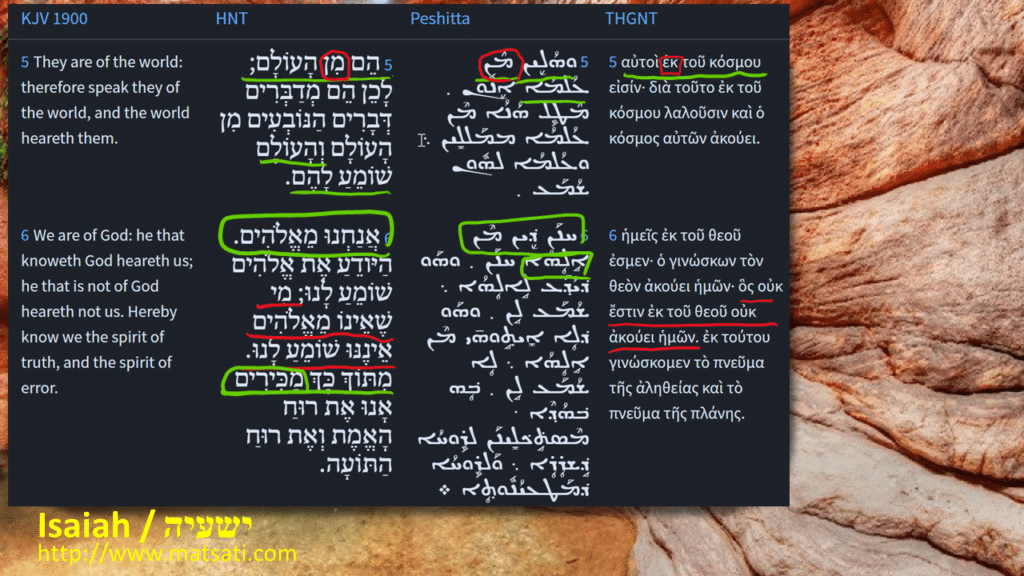
John speaks of those who are ܘܗܳܠܷܝܢ ܡܶܢ ܥܳܠܡܳܐ of the world (הֵם מִן הָעוֹלָם) and the world listens to them (ܘܥܳܠܡܳܐ ܠܗܽܘܢ ܫܳܡܰܥ, וְהָעוֹלָם שׁוֹמֵעַ לָהֶם). In each of these translations, we find what is written according to the Greek, αὐτοὶ ἐκ τοῦ κόσμου “he that is from (ἐκ) the world.” This is an important observation since the one who is “from” (מִן ,ܡܶܢ ,ἐκ) the world directs us to the origin of these people whom the world listens to. The world listens to them because of what The TgJ writes translating Isaiah 19:14 saying, יד יוי רְמָא בֵינֵיהֹון רוּחַ דְטָעוּ וְאַטעִיוּ יָת מִצרָאֵי בְכָל עוּבָדֵיהֹון כְמָא דְטָעֵי רָויָא וּמִידַשדַש בְתֹובֵיה׃ 19:14 The Lord hath sent among them a spirit of error, and they have caused the Egyptians to err in all their works, as a drunkard staggereth, and tramples in his vomit. (TgJ) John says מִי שֶׁאֵינוֹ מֵאֱלֹהִים אֵינֶנּוּ שׁוֹמֵעַ לָנוּ “He who is not from God does not listen to us” (ὃς οὐκ ἔστιν ἐκ τοῦ θεοῦ οὐκ ἀκούει ἡμῶν) meaning that such people are unable to listen with understanding of the Word of God because their origins are not from God but from this world. This spirit of error leads the Egyptians in their error to walk according to their false gods. (Note the modern parallel example given above.) John writes ἐκ τούτου γινώσκομεν τὸ πνεῦμα τῆς ἀληθείας καὶ τὸ πνεῦμα τῆς πλάνης “from this we know the spirit of truth and the spirit of error” The Hebrew translation writes מִתּוֹךְ כָּךְ מַכִּירִים indicating “knowing” (מַכִּירִים) as from the sense of being “acquainted with” or “familiar with” recognizing the spirit of truth (ܠܪܾܘܚܳܐ ܕܱ݁ܫܪܴܪܴܐ, רוּחַ הָאֱמֶת) as opposed to the spirit of error (ܘܰܠܪܾܘܚܳܐ ܕ݁ܡܰܛܥܝܳܢܽܘܬ݂ܴܐ, רוּחַ הַתּוֹעָה) which is confusion. Rashi writes the following concerning Isaiah 19:14.
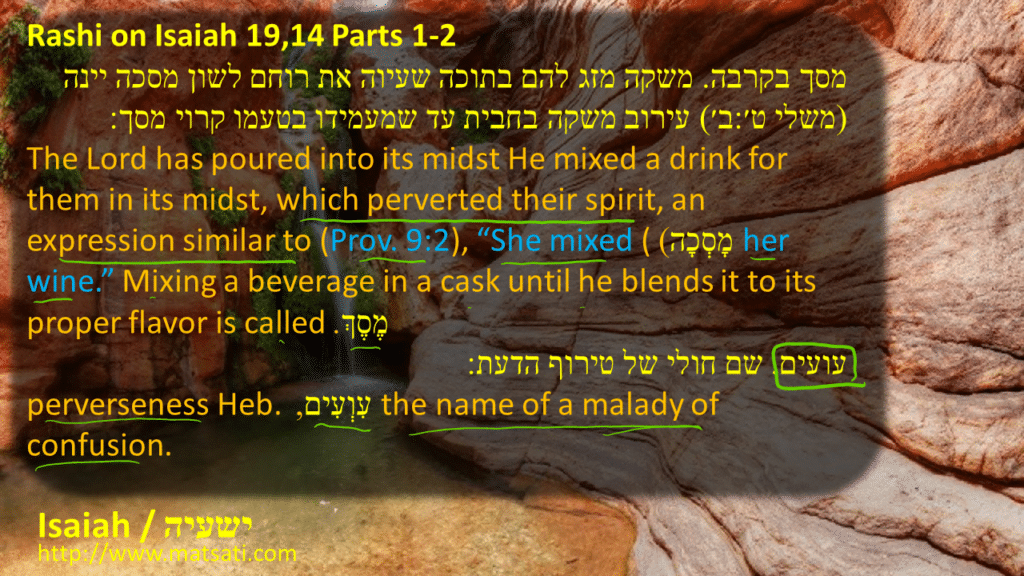
Rashi on Isaiah 19,14 Parts 1-2
מסך בקרבה. משקה מזג להם בתוכה שעיוה את רוחם לשון מסכה יינה (משלי ט׳:ב׳) עירוב משקה בחבית עד שמעמידו בטעמו קרוי מסך: The Lord has poured into its midst He mixed a drink for them in its midst, which perverted their spirit, an expression similar to (Prov. 9:2), “She mixed (מָסְכָה) her wine.” Mixing a beverage in a cask until he blends it to its proper flavor is called מֶסֶךְ.
עועים. שם חולי של טירוף הדעת: perverseness Heb. עִוְעִים, the name of a malady of confusion.
Rashi interprets this as the Lord God of Israel pouring out His mixed drink in their midst which has the effect of perverting their spirit. Remember when we drink something it becomes a part of our lives and our bodies. When one willingly drinks alcohol and the effects are manifested in his or her body providing the illustration of disobedience through the stumbling around (how one lives in disobedience). The parallel to alcoholic beverages is a perfect example how alcohol has the capacity to cause one to stumble. Rashi parallels this to Mishley / Proverbs 9:2 and wisdom mixing her wine to cause one to be wise to walk in God’s holy ways. Wisdom’s mixed drink causes humility, devotion to God, and leads one to prayer. Humility is a major weapon to being set free from the רוּחַ דְטָעוּ spirit of error, and the reason being, pride causes one to fall, for those who trust in the flesh as opposed to the spirit. (Note the Isaianic parallels in Isaiah 1-12.) Humility leads to our submitting our lives to the Lord and to His Word, we submit because we hear Him, and humility causes us to trust in Him to make us strong in the midst of trials and in the midst of our weakness. The way to successfully overcome the evil one, is by faith in Yeshua the Messiah, who strengthens us in the ܠܪܾܘܚܳܐ ܕܱ݁ܫܪܴܪܴܐ, רוּחַ הָאֱמֶת “spirit of truth” which is given from God. Devotion is a function of אֲנַחְנוּ מֵאֱלֹהִים ἡμεῖς ἐκ τοῦ θεοῦ (ܚܢܰܢ ܕܷ݁ܝܢ ܡܶܢ ܐܱܠܴܗܳܐ) our being from God we are capable of hearing His word, listening, and obeying. Devotion leads to consecration from the sense of separating ourselves from this world, and walking in God’s holy and righteous ways. This is how the Psalmist spoke in relation to these things according to Tehillim / Psalms 91:1-3. Being from God means that He is our source of origin, we have an intimate relationship with Him.
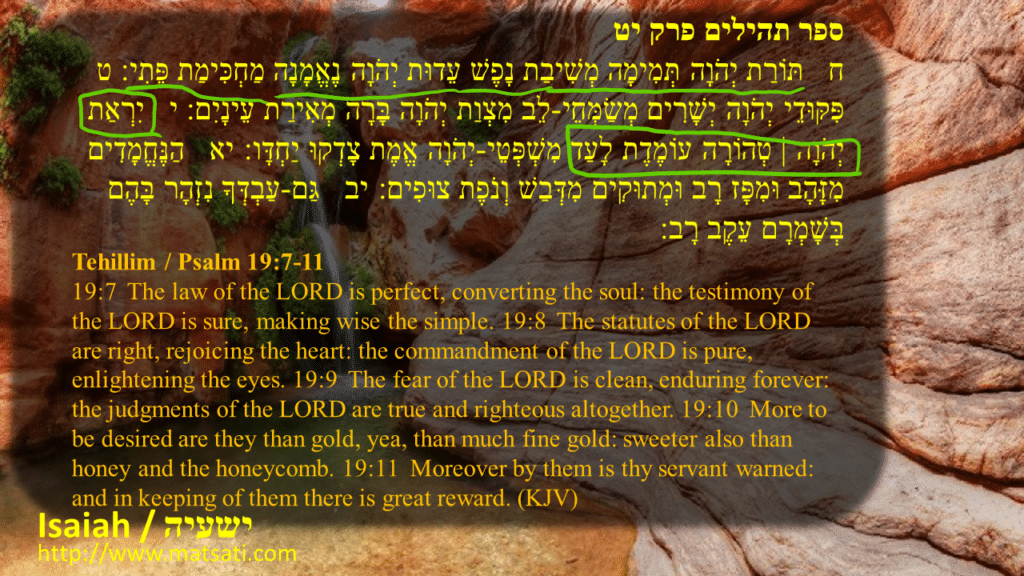
ספר תהילים פרק צא
א ישֵׁב בְּסֵתֶר עֶלְיוֹן בְּצֵל שַׁדַּי יִתְלוֹנָן: ב אֹמַר לַיהֹוָה מַחְסִי וּמְצוּדָתִי אֱלֹהַי אֶבְטַח-בּוֹ: ג כִּי הוּא יַצִּילְךָ מִפַּח יָקוּשׁ מִדֶּבֶר הַוּוֹת::
Tehillim / Psalms 91:1-3
91:1 He that dwelleth in the secret place of the most High shall abide under the shadow of the Almighty. 91:2 I will say of the LORD, He is my refuge and my fortress: my God; in him will I trust. 91:3 Surely he shall deliver thee from the snare of the fowler, and from the noisome pestilence. (KJV)
Being that אֲנַחְנוּ מֵאֱלֹהִים ἡμεῖς ἐκ τοῦ θεοῦ (ܚܢܰܢ ܕܷ݁ܝܢ ܡܶܢ ܐܱܠܴܗܳܐ) “we are from God” we are living in the shadow of the Almighty God. This idea of making God our refuge, leads to prayer against the רוּחַ דְטָעוּ spirit of error (ܘܰܠܪܾܘܚܳܐ ܕ݁ܡܰܛܥܝܳܢܽܘܬ݂ܴܐ, רוּחַ הַתּוֹעָה). Prayer is a key tool since Yeshua said pray such that you are not tempted according to Matthew 26:41. Prayer in fact connects us with the spirit of truth (ܠܪܾܘܚܳܐ ܕܱ݁ܫܪܴܪܴܐ, רוּחַ הָאֱמֶת) and helps us to understand God’s Word, and what the Lord God intends for our lives. Paul wrote according to Ephesians 1:17-18, “That the God of our Lord Jesus Christ, the Father of glory, may give to you the spirit of wisdom and revelation in the knowledge of Him, the eyes of your understanding being enlightened” indicating the power of the Spirit of God to give us these things. The Talmud Bavli Makkot 10a has the following to say concerning these things.
Talmud Bavli Makkot 10a
Rav Ashi says: Anyone who loves to study in abundance, i.e., with many colleagues, to him shall be increase, i.e., he will succeed in his studies. And that is parallel to that which Rabbi Yosei, son of Rabbi Ḥanina, says: What is the meaning of that which is written: “A sword is upon the baddim, veno’alu” (Jeremiah 50:36)? It is fitting that a sword be placed on the necks of the enemies of Torah scholars, a euphemism for Torah scholars, who sit and engage in the study of the Torah individually [bad bevad]. Moreover, they grow foolish through individual study, as it is written here: Veno’alu, and it is written there: “For we have been foolish [no’alnu]” (Numbers 12:11). Moreover, they thereby sin, as it is stated immediately thereafter: “And for we have sinned.” And if you wish, say that from here it is derived that no’alu means sinned: “The ministers of Zoan have sinned [no’alu]” (Isaiah 19:13).
The idea here is to the benefits of studying God’s Word and to those who love to study God’s Word. When we learn how to study the Scriptures and hear God’s voice, then the Lord God reveals Himself and His will and calling for our lives. This is exactly what Moshe sought from God to reveal himself so that he might know Him in a more intimate way! Remember what Moshe wrote according to the Torah in Shemot / Exodus 33:13-18
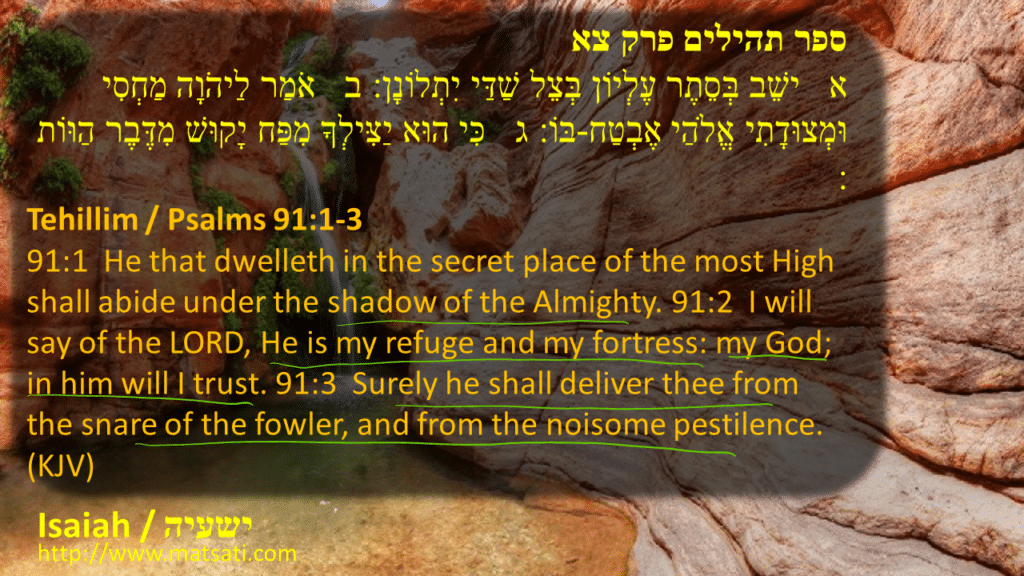
ספר שמות פרק לג
יג וְעַתָּה אִם-נָא מָצָאתִי חֵן בְּעֵינֶיךָ הוֹדִעֵנִי נָא אֶת-דְּרָכֶךָ וְאֵדָעֲךָ לְמַעַן אֶמְצָא-חֵן בְּעֵינֶיךָ וּרְאֵה כִּי עַמְּךָ הַגּוֹי הַזֶּה: יד וַיֹּאמַר פָּנַי יֵלֵכוּ וַהֲנִחֹתִי לָךְ: טו וַיֹּאמֶר אֵלָיו אִם-אֵין פָּנֶיךָ הֹלְכִים אַל-תַּעֲלֵנוּ מִזֶּה: טז וּבַמֶּה | יִוָּדַע אֵפוֹא כִּי-מָצָאתִי חֵן בְּעֵינֶיךָ אֲנִי וְעַמֶּךָ הֲלוֹא בְּלֶכְתְּךָ עִמָּנוּ וְנִפְלִינוּ אֲנִי וְעַמְּךָ מִכָּל-הָעָם אֲשֶׁר עַל-פְּנֵי הָאֲדָמָה: פ [רביעי] יז וַיֹּאמֶר יְהֹוָה אֶל-מֹשֶׁה גַּם אֶת-הַדָּבָר הַזֶּה אֲשֶׁר דִּבַּרְתָּ אֶעֱשֶֹה כִּי-מָצָאתָ חֵן בְּעֵינַי וָאֵדָעֲךָ בְּשֵׁם: יח וַיֹּאמַר הַרְאֵנִי נָא אֶת-כְּבֹדֶךָ:
Shemot / Exodus 33:13-18
33:13 Now therefore, I pray thee, if I have found grace in thy sight, shew me now thy way, that I may know thee, that I may find grace in thy sight: and consider that this nation is thy people. 33:14 And he said, My presence shall go with thee, and I will give thee rest. 33:15 And he said unto him, If thy presence go not with me, carry us not up hence. 33:16 For wherein shall it be known here that I and thy people have found grace in thy sight? is it not in that thou goest with us? so shall we be separated, I and thy people, from all the people that are upon the face of the earth. 33:17 And the LORD said unto Moses, I will do this thing also that thou hast spoken: for thou hast found grace in my sight, and I know thee by name. 33:18 And he said, I beseech thee, shew me thy glory. (KJV)
Moshe asks the Lord to show him His ways so that he might know the Lord (וְעַתָּה אִם-נָא מָצָאתִי חֵן בְּעֵינֶיךָ הוֹדִעֵנִי נָא אֶת-דְּרָכֶךָ וְאֵדָעֲךָ לְמַעַן אֶמְצָא-חֵן בְּעֵינֶיךָ). This is related to whether our hearts turn away or turn towards the Lord. If one is turned away from the Lord into disobedience, he or she will be drawn away to bow down to other gods and worship them. (This is true even today) According to Isaiah and the Torah, be assured destruction will come! (Note that if we are not in the word daily, we are going to be drawn away in the day-to-day activities, and by what we watch on television, untruth will be mingled into our understanding of truth and righteousness.) Remember Moshe wrote concerning the heavens and the earth, that heaven and earth is a witness to life and death, blessings and curses, all of which are dependent upon whether we are willing to seek the Lord or turn from Him and His holy ways. (Note that to “turn towards” means to apply God’s word to our lives.) We also remember the NT text, that without Yeshua we cannot have the abundant life meaning that Yeshua empowers us in our purpose for life which is to serve the Lord God Almighty in heaven. If we are not daily studying and reading God’s word in the Bible, then it will become very difficult to have fellowship with God and partake of the abundant life that is promised to us. (John 10:10) John also wrote in his epistle saying, 1 John 5:3 “this is love for God: to keep his commands. And his commands are not burdensome.” The Torah tells us the same thing according to Devarim / Deuteronomy 30:11. This truth reveals or provides empirical evidence, observational phenomena that we can see on a personal level, to determine whether we are truly living our lives for the Lord out of love for Him, and whether we have reverence (respect / fear) and trust in Him, through obedience to His Word. Notice how David understands these things according to Tehillim / Psalms 19:7-11.
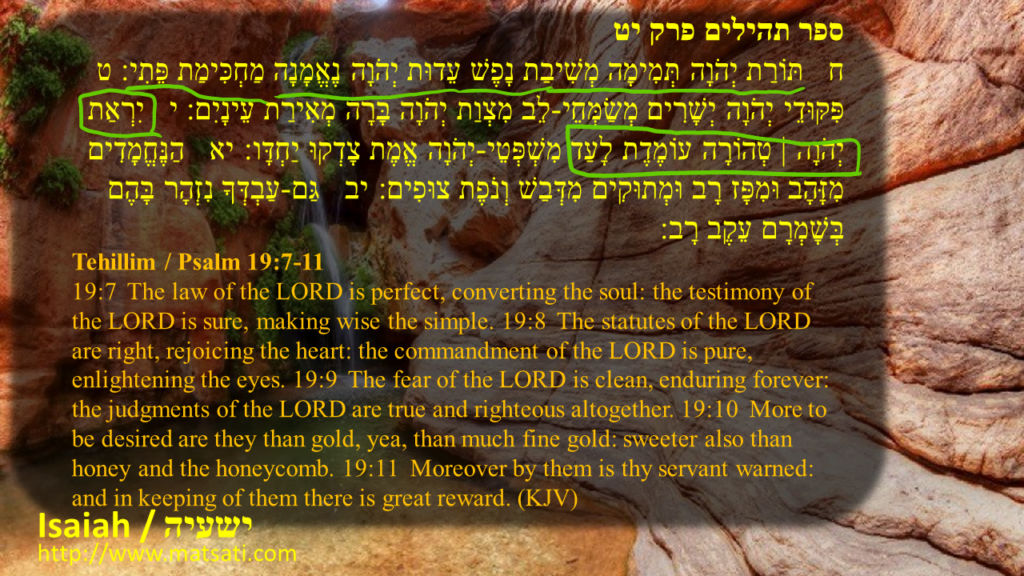
ספר תהילים פרק יט
ח תּוֹרַת יְהֹוָה תְּמִימָה מְשִׁיבַת נָפֶשׁ עֵדוּת יְהֹוָה נֶאֱמָנָה מַחְכִּימַת פֶּתִי: ט פִּקּוּדֵי יְהֹוָה יְשָׁרִים מְשַֹמְּחֵי-לֵב מִצְוַת יְהֹוָה בָּרָה מְאִירַת עֵינָיִם: י יִרְאַת יְהֹוָה | טְהוֹרָה עוֹמֶדֶת לָעַד מִשְׁפְּטֵי-יְהֹוָה אֱמֶת צָדְקוּ יַחְדָּו: יא הַנֶּחֱמָדִים מִזָּהָב וּמִפָּז רָב וּמְתוּקִים מִדְּבַשׁ וְנֹפֶת צוּפִים: יב גַּם-עַבְדְּךָ נִזְהָר בָּהֶם בְּשָׁמְרָם עֵקֶב רָב:
Tehillim / Psalm 19:7-11
19:7 The law of the LORD is perfect, converting the soul: the testimony of the LORD is sure, making wise the simple. 19:8 The statutes of the LORD are right, rejoicing the heart: the commandment of the LORD is pure, enlightening the eyes. 19:9 The fear of the LORD is clean, enduring forever: the judgments of the LORD are true and righteous altogether. 19:10 More to be desired are they than gold, yea, than much fine gold: sweeter also than honey and the honeycomb. 19:11 Moreover by them is thy servant warned: and in keeping of them there is great reward. (KJV)
David writes the Torah of God is perfect (תְּמִימָה) and rejoices the heart. We note today’s perspective, the negative light that is placed upon the Torah (Law) of God in the modern antinomian theologies that are taught these days. David writes that the love of God’s Torah and the fear of the Lord is more desirable than that of gold and sweeter than honey. David believed there is a reward for those who keep God’s commands. The point is to why we seek the Lord God according to His Word, because of His great love for us! Because the Lord God is on our side, we read according to the TgJ what happens to the Egyptians. טו וְלָא יְהֵי לְמִצרָאֵי מַלכָא דְיִמלֹוך † רֵיש וְהַגמֹון שִלטֹון וְאִיטְרֹון׃ 19:15 And the Egyptians shall have no king to reign, no prince, noble, governor, or ruler. טז בְעִידָנָא הַהוּא יְהֹון מִצרָאֵי חַלָשִין כִנשַיָא וִיזוּעוּן וְיִתַברוּן מִן קֳדָם אְרָמוּת גְבוּרְתָא דַיוי צְבָאֹות דְהוּא מְרִים עְלֵיהֹון׃ 19:16 At that time the Egyptians shall be weak, they shall be afraid, and fear on account of the exultation of the power of the Lord of hosts, which He is lifting up against them. יז וּתהֵי אַרעָא דְבֵית יְהוּדָה לְמִצרָיִם לְדַחלָא כָל דְיַדכַר יָתַה לֵיה יְזוּעַ מִן קֳדָם מִלכָא דַיוי צְבָאֹות דְהוּא מְלִיך עְלֵיהֹון׃ 19:17 And the land of the house of Judah shall be a terror unto Egypt; if any one mention it unto them, they shall tremble; because of the counsel of the Lord of hosts, which he hath counselled against them. (TgJ) Terror fills the hearts of the peoples of the nations, specifically Egypt here according to Isaiah because they have not trusted in the God of Israel. This will occur only for those who are disobedient. Rashi states the following concerning these things:
Rashi on Isaiah 19:17 Part 1
והיתה אדמת יהודה למצרים לחגא. כשישמעו הנותרים במצרים משבי סנחרב את מפלתו שיפול בארץ יהודה בלא שום מלחמות זרוע בשר ידעו כי יש שכינה בישראל ומושיעם חזק וייראו ויפחדו מפני אדמת יהודה: And the land of Judah shall be to Egypt for a dread When those remaining in Egypt from the captivity of Sennacherib hear of his downfall, that he will fall in the land of Judah without any physical warfare, they will know that the Divine Presence is manifest in Israel and that their Savior is mighty, and they will fear and be frightened of the land of Judah.
חגא. לשון שבר ואימה ופחד לשון יחוגו וינועו כשכור (תהילים ק״ז:כ״ז) וכן חגוי הסלע (שיר ב): a dread Heb. לְחָגָּא, an expression of a breach and fear and fright, similar to (Psalms 107:27): “They were frightened (יָחוֹגוּ) and wander like a drunkard,” similarly (Song 2:14), “In the cracks of (בְּחַגְוֵי) the rock.”
מפני עצת ה’ צבאות אשר הוא יועץ עליו. להפילו ביד סנחרב ויהודה ימלט מידו: because of the plan of the Lord of Hosts which he planned against him to cause him to fall into the hands of Sennacherib, and Judah will escape from his hand.
Rashi connects these words to the powerful deliverance that God had provided for Israel when Sennacherib came to attack Jerusalem and during the night God had killed by the hand of an Angel, 185,000. This illustrates for us the miracles of faith and how the Lord God smote many in defense of righteousness and for the sake of His promises to Abraham, Isaac, and Jacob. Because of the way in which the Lord God will work in Egypt, Isaiah continues according to the TgJ saying, יח בְעִידָנָא הַהוּא יִהוְייָן חְמֵיש קִרוִין בְאַרעָא דְמִצרַיִם מְמַלְלָן מַמלַל כְנַעְנָאָה וּמקַיְימָן בִשמָא דַיוי צְבָאֹות קַרתָא בֵית שַמַש דְעַתִידָא לְמִחרַב יִתאְמַר הִיא חְדָא מִנְהֹון׃ 19:18 At that time, there shall be five cities in the land of Egypt, speaking the language of Canaan, and swearing by the name of the Lord of hosts. The city of Beth-Shemesh, which is to be destroyed, shall be called one of them. יט בְעִידָנָא הַהוּא יְהֵי מַדבְחָא מְתֻקַן קֳדָם יוי בְגֹו אַרעָא דַמִצרָיִם וְקָמְתָא בִסטַר תְחוּמַה קֳדָם יוי׃ 19:19 At that time there shall be prepared an altar before the Lord in the midst of the land of Egypt: and a pillar by the border thereof before the Lord. (TgJ) Here there appears to be a message of a change of heart, where the people will turn to the Lord, and the Egyptians will be so motivated that they will begin to learn, taking up the language of Israel. This suggests their doing so for the purpose of reading God’s holy Word. This is indicated according to Isaiah 19:19 which speaks of there being an altar and a pillar in Egypt, two things which are representative of Abraham and Jacob, respectively. The Talmud writes the following concerning Isaiah 19:19.
Talmud Bavli Menachot 109b:16
His fellow priests wanted to kill Shimi. Shimi then told them the entire incident, that he had been tricked by his brother Onias, so the priests wanted to kill Onias. Onias ran away from them, and they ran after him. Onias ran to the palace of the king, and they ran after him. Anyone who saw him would say: This is him, this is him, and he was not able to escape unnoticed. Onias went to Alexandria in Egypt and built an altar there, and sacrificed offerings upon it for the sake of Heaven. As it is stated: “In that day shall there be an altar to the Lord in the midst of the land of Egypt, and a pillar at its border, to the Lord” (Isaiah 19:19). According to Rabbi Yehuda, the temple of Onias was dedicated to the worship of God.
The Talmud writes of Shimi and Onias as a possible origin of the altar and the pillar in Egypt. Historically, Simon the second was a Jewish high priest from 219-196 BC during the reign of Seleucid king Antiochus III. Simon II succeeded his father Onias II as the high priest in 219 BC. At the outset of his priesthood, Ptolemies and the Seleucids were at war, vying for control of Israel. Simon offered his support to the Seleucid king Antiochus III, who eventually defeated the Ptolemies and controlled all of Judea. The political support Simon extended to Antiochus III led to the Seleucid king’s favorable treatment of the citizens in Judea. In addition to thanking the residents of Jerusalem for their support (Josephus, Antiquities 12.3. 138–144), Antiochus III also issued a decree that reduced taxes for the citizens, prohibited foreigners from entering the sanctuary, and ordered that the damages incurred to the city and the temple during the war be refurbished (Josephus Antiquities 12.4.145–147). Because of this favorable treatment by Antiochus III, the citizens of Judea considered Simon the ideal political leader. (Wright, “Eschatology,” 322). Simon II was succeeded as high priest by his son, Onias III (compare Schäfer, History, 32). Based upon historical survey of Shimi and Onias, it is difficult to say who this Onias was who went to Alexandria in Egypt, but the history suggests this was a man of faith, a priest, leading some credence to the Talmudic account. The Talmud Bavli goes on saying the following concerning Isaiah 19:19:
Talmud Bavli Menachot 110a:1
and swear to the Lord of hosts; one shall be called the city of destruction” (Isaiah 19:18). They went to Alexandria in Egypt and built an altar and sacrificed offerings upon it for the sake of Heaven, as it is stated in the following verse: “In that day shall there be an altar to the Lord in the midst of the land of Egypt, and a pillar at its border, to the Lord” (Isaiah 19:19).
According to the Talmud, the altar was not one that was made to be a memorial like what we see according to Joshua 22:11, “And the children of Israel heard say, Behold, the children of Reuben and the children of Gad and the half tribe of Manasseh have built an altar over against the land of Canaan, in the borders of Jordan, at the passage of the children of Israel.” (KJV, וַיִּשְׁמְע֥וּ בְנֵֽי־יִשְׂרָאֵ֖ל לֵאמֹ֑ר הִנֵּ֣ה בָנ֣וּ בְנֵֽי־רְאוּבֵ֣ן וּבְנֵי־גָ֡ד וַחֲצִי֩ שֵׁ֨בֶט הַֽמְנַשֶּׁ֜ה אֶת־הַמִּזְבֵּ֗חַ אֶל־מוּל֙ אֶ֣רֶץ כְּנַ֔עַן אֶל־גְּלִילוֹת֙ הַיַּרְדֵּ֔ן אֶל־עֵ֖בֶר בְּנֵ֥י יִשְׂרָאֵֽל׃) Even if the people have faith in the God of Israel, to build an altar and make sacrifices upon this altar, this would be contradictory to the Torah since the Torah states the people are to go to the place where God has established His name, that is in Jerusalem. This is why in Isaiah 2, we read what we do the nations streaming to Jerusalem, because this is the Torah based perspective.
Isaiah continues according to the TgJ saying, כ וִיהֵי לְאָת וּלסָהִיד קֳדָם יוי צְבָאֹות בְאַרעָא דְמִצרָיִם אְרֵי יְצַלֹון קֳדָם יוי מִן קֳדָם דָחְקֵיהֹון וְיִשלַח לְהֹון פָרִיק וְדַייָן וִישֵיזֵיבִנוּן׃ 19:20 And it shall be for a sign, and for a witness before the Lord of hosts in the land of Egypt, when they shall pray before the Lord because of their oppressors, and He shall send unto them a Saviour, and a Judge, and He shall deliver them. כא וְתִתגְלֵי גְבוּרְתָא דַיוי לְאֵיטָבָא לְמִצרָאֵי וְיִדְעוּן מִצרָאֵי לְמִדחַל מִן קֳדָם יוי בְעִידָנָא הַהוּא וְיִפלְחוּן בְנִכסַת קֻדשִין וּבקֻרבָנִין וְינַדרוּן נִדרִין קֳדָם יוי וִישַלְמוּן׃ 19:21 And the power of the Lord shall be revealed to do good to the Egyptians, and the Egyptians shall know the fear of the Lord at that time, and they shall worship with holy sacrifices and offerings; yea, they shall vow vows before the Lord, and shall perform them. כב וְיִמחֵי יוי יָת מִצרָאֵי מַחָא וְיַסֵינוּן וִיתוּבוּן לְפוּלחָנָא דַיוי וִיקַבֵיל צְלֹותְהֹון וְיַסֵי יָתְהֹון׃ 19:22 And the Lord shall smite Egypt with a stroke, and shall heal them, and they shall return to the worship of the Lord, and He shall hear their prayers, and shall heal them. כג בְעִידָנָא הַהוּא תְהֵי אֹורַח כְבִישָא מִמִצרַיִם לְאַתוּר וִיגִיחוּן אַתוּרָאֵי בְמִצרָאֵי וּמִצרָאֵי בְאַתוּרָאֵי וְיִפלְחוּן מִצרָאֵי יָת אַתוּרָאֵי׃ 19:23 And at that time there shall be a highway from Egypt to Assyria; and the Assyrians shall fight against the Egyptians, and the Egyptians against the Assyrians, and the Egyptians shall serve the Assyrians. כד בְעִידָנָא הַהוּא יְהֵי יִשׂרָאֵל תְלִיתַי לְמִצרָאֵי וּלאַתוּרָאֵי בִרכָא בְגַוַה דְאַרעָא׃ 19:24 And at that time Israel shall be a third party to the Egyptians and to the Assyrians, a blessing in the midst of the land. כה דְבָרְכֵיה יוי צְבָאֹות לְמֵימַר בְרִיך עַמִי דְאַפֵיקִית מִמִצרַיִם דְעַל דְחָבוּ קֳדָמַי אַגלִיתִי יָתְהֹון לְאַתוּר וְכַדוּ דְתָבוּ מִתקְרַן עַמִי וְאַחסָנְתִי יִשׂרָאֵל׃ 19:25 Whom the Lord of hosts hath blessed, saying, Blessed be my people, whom I have brought out of Egypt; and because they sinned before me, I carried them captive into Assyria; but when they repent, they are called my people, and Israel mine inheritance. (TgJ) It is interesting to read what Isaiah says according to Isaiah 19:22. This speaks to the healing mercy of God having foreknowledge of their sins and being stricken, and the mercy of God drawing them back to repentance and healing. It is important to note that this parallels the discipline of a father to his son. A father punishes his son when he does something wrong. This does not mean that the father does not love his son. Similar parallel to our Father in heaven who brings discipline when there is unrepentant sin, to draw us back to truth and life through repentance. The Midrash Shir HaShirim Rabbah and Rashi have the following to say concerning the interpretation of Isaiah 19:22.
Shir HaShirim Rabbah 4:5 Part 1
Rava in the name of Rabbi Shimon: Flesh and blood does not prepare a dressing until he sees the wound; however, He who spoke and the world came into being is not so, but rather He prepares the dressing and then strikes. That is what is written: “Behold I am bringing it a remedy and a cure, and I will heal them…” (Jeremiah 33:6),80He prepared the cure for Jerusalem before He struck it. and it is written: “When I will heal Israel” (Hosea 7:1). The Holy One blessed be He said: I came to heal the iniquities of Israel, “and the iniquity of Ephraim and the evils of Samaria will be revealed” (Hosea 7:1).81Only after preparing the cure will they be taken to task for their wickedness. However, the nations of the world, He strikes them and only then heals them, as it is stated: “The Lord will strike Egypt, striking and healing” (Isaiah 19:22). Striking by means of Aaron and healing by means of Moses. Blessed are these two brothers who were created only for the glory of Israel. That is what the prophet Samuel said: “The Lord who produced Moses and Aaron” (I Samuel 12:6). That is “your two breasts” – these are Moses and Aaron.
Rashi on Isaiah 19:22 Parts 1-3
ונגף. לשון מכה הוא: And…shall plague Heb. נָגֹף. This is an expression of smiting.
נגוף ורפוא. ואחר המכה יביא להם רפואה: plaguing and healing And after the plague, He will create a cure for them.
ונעתר להם. ירצה להם: and He shall accept their prayer [lit.] and He shall be reconciled with them.
The mercy of God interpreted here in the Midrash reminds us of what we read in the Torah, especially from the sense of how Jeremiah explains “Behold I am bringing it a remedy and a cure, and I will heal them…” (Jeremiah 33:6) In the Torah we read how Moshe wrote he sets both a blessing and a curse before the people according to Devarim / Deuteronomy 11:26-28.
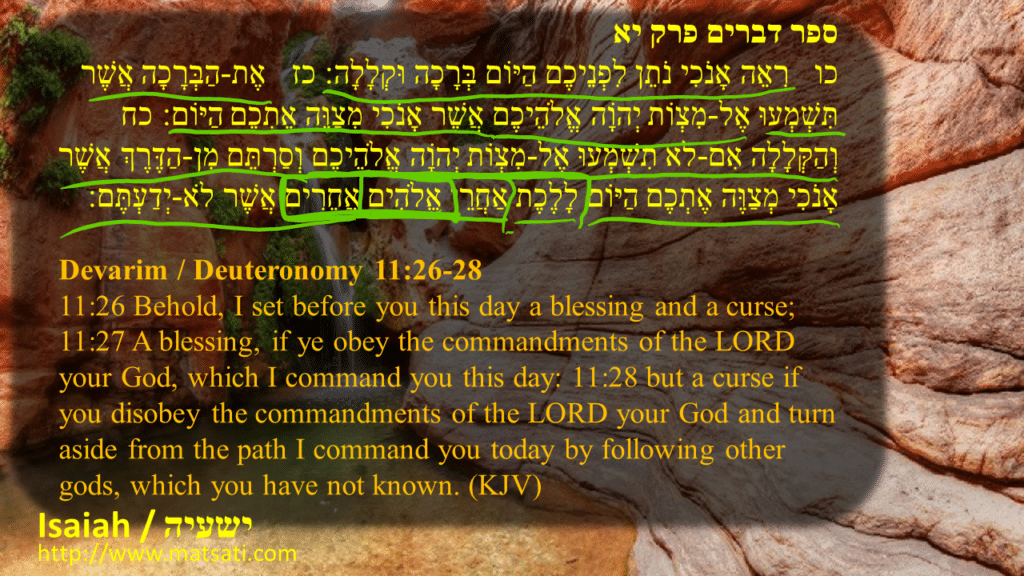
ספר דברים פרק יא
כו רְאֵה אָנֹכִי נֹתֵן לִפְנֵיכֶם הַיּוֹם בְּרָכָה וּקְלָלָה: כז אֶת-הַבְּרָכָה אֲשֶׁר תִּשְׁמְעוּ אֶל-מִצְוֹת יְהוָֹה אֱלֹהֵיכֶם אֲשֶׁר אָנֹכִי מְצַוֶּה אֶתְכֶם הַיּוֹם: כח וְהַקְּלָלָה אִם-לֹא תִשְׁמְעוּ אֶל-מִצְוֹת יְהוָֹה אֱלֹהֵיכֶם וְסַרְתֶּם מִן-הַדֶּרֶךְ אֲשֶׁר אָנֹכִי מְצַוֶּה אֶתְכֶם הַיּוֹם לָלֶכֶת אַחֲרֵי אֱלֹהִים אֲחֵרִים אֲשֶׁר לֹא-יְדַעְתֶּם:
Devarim / Deuteronomy 11:26-28
11:26 Behold, I set before you this day a blessing and a curse; 11:27 A blessing, if ye obey the commandments of the LORD your God, which I command you this day: 11:28 but a curse if you disobey the commandments of the LORD your God and turn aside from the path I command you today by following other gods, which you have not known. (KJV)
We note that within the blessing and the curse (בְּרָכָה וּקְלָלָה) is this concept of נגוף ורפוא “plague and healing” or as Jeremiah says, “the remedy and the cure.” Note how our actions if they are unholy, unrighteous, and unrepentant, this brings the curse upon our lives. God’s remedy for sin is to bring the consequences of our sins. The solution is to turn from our unholy ways to the Lord God Almighty and His holy ways to forsake our ways. We find this concept לָלֶכֶת אַחֲרֵי אֱלֹהִים אֲחֵרִים “following after other gods” throughout the Tanakh, which is an important and very relevant point Moshe is making for us even for today! The Midrash writes “The Holy One blessed be He said: I came to heal the iniquities of Israel, ‘and the iniquity of Ephraim and the evils of Samaria will be revealed’ (Hosea 7:1).” This demonstrates the Love of God towards His people, always seeking for His people to return to Him. The Midrash parallels this to both Jew and Gentile saying, “‘The Lord will strike Egypt, striking and healing’ (Isaiah 19:22). Striking by means of Aaron and healing by means of Moses.” Note according to the Midrash and Isaiah how the Torah is relevant for both the Jew and Gentile! Rashi explains that God will strike the nations for the purpose of repentance noted in the people praying to Him and He will listen to their prayers and heal them. This entire process is meant to be transformative. We are first transformed through God working in our lives. This is what we see in the story of the Exodus, how the people’s lives were completely transformed when God began to work in their lives and delivering them from slavery in Egypt. (This is the biblical pattern.) This is why Yeshua quoted Samuel stating, “Go and learn what this means, I desire mercy, and not sacrifice” and he continued saying “for I came not to call the righteous, but sinners.” (See Matthew 9:13) The Torah based pattern here is sustained / established, first we realize we are broken and need the Lord and mourn concerning our sinful condition (Matthew 5:3-4). Then we hunger and thirst for the righteousness of God, for His healing, deliverance, and revelation of truth and ultimately to learn to trust in the mercy of God. When we come to this point, we begin to see how the Lord God is working in our lives and our relationships. Following these things, we realize how God’s mercy has been present throughout all of these things. This then allows us to genuinely repent from our sins and walk in the expression of truth and life that God has given us according to His Word. This is what Isaiah speaks of concerning Egypt in Isaiah 19:21 according to the TgJ, כא וְתִתגְלֵי גְבוּרְתָא דַיוי לְאֵיטָבָא לְמִצרָאֵי וְיִדְעוּן מִצרָאֵי לְמִדחַל מִן קֳדָם יוי בְעִידָנָא הַהוּא וְיִפלְחוּן בְנִכסַת קֻדשִין וּבקֻרבָנִין וְינַדרוּן נִדרִין קֳדָם יוי וִישַלְמוּן׃ 19:21 And the power of the Lord shall be revealed to do good to the Egyptians, and the Egyptians shall know the fear of the Lord at that time, and they shall worship with holy sacrifices and offerings; yea, they shall vow vows before the Lord, and shall perform them. (TgJ) The גְבוּרְתָא דַיוי “power of God” is revealed for a good work in the lives of the people. Note how significant this is for our lives today, the Lord God Almighty, the God of Israel is calling out to us to repent and seek a relationship with Him. This is the transformation by grace that we are given in the Messiah Yeshua in the power of God demonstrating how beloved we are of God. Note what Isaiah and all of these things are teaching us, that the mercy of God extends to both the Jew and the Gentile! (Romans 10:12)
